牛津小学英语B词汇句型归纳
小学牛津英语六年级B第10单元单词及造句应用
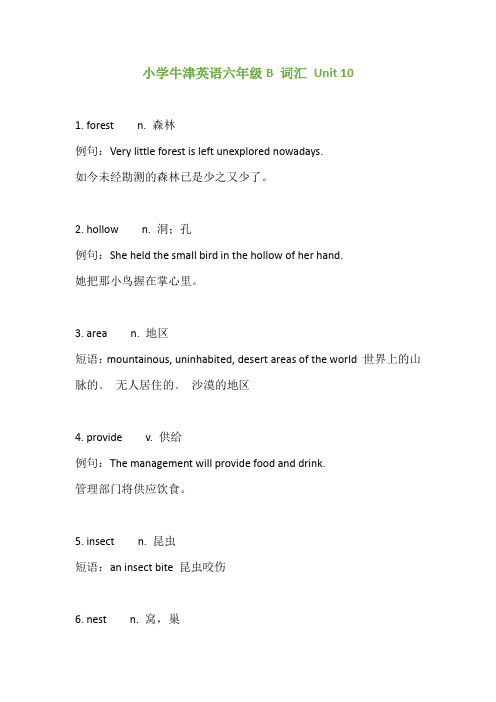
小学牛津英语六年级B 词汇Unit 101. forest n. 森林例句:Very little forest is left unexplored nowadays.如今未经勘测的森林已是少之又少了。
2. hollow n. 洞;孔例句:She held the small bird in the hollow of her hand.她把那小鸟握在掌心里。
3. area n. 地区短语:mountainous, uninhabited, desert areas of the world 世界上的山脉的﹑无人居住的﹑沙漠的地区4. provide v. 供给例句:The management will provide food and drink.管理部门将供应饮食。
5. insect n. 昆虫短语:an insect bite 昆虫咬伤6. nest n. 窝,巢短语:an ants' nest 蚁穴 a wasp's nest 黄蜂巢.7. build v. 建造短语:build a house, road, railway 修建房屋﹑道路﹑铁路8. wood n. 木头例句:Tables are usually made of wood.桌子多为木制的。
9. cut down 砍倒短语:cut down a tree 砍倒一棵树10. furniture n. 家具例句:They have a lot of antique furniture.他们有很多古董家具。
11. clay n. 黏土短语:clay soil 黏质土壤12. wool n. 羊毛例句:These goats are specially bred for their wool.这些山羊是专为剪取羊毛而饲养的。
13. cotton n. 棉花短语:working in the cotton fields 在棉田里干活14. plastic n&adj 塑料(的)短语:a plastic cup, raincoat, spoon, toy, watch 塑料杯﹑雨衣﹑羹匙﹑玩具﹑手表15. oil n. 油;石油短语:coconut/sunflower/vegetable oil 椰子油﹑葵花籽﹑菜籽油16. metal n&adj 金属(的)例句:There isn't much metal in the bodywork of this new car; it's mainly plastic.这辆新汽车的车身没用多少金属材料, 大部分是塑料的。
小学牛津英语单词总汇(带音标)
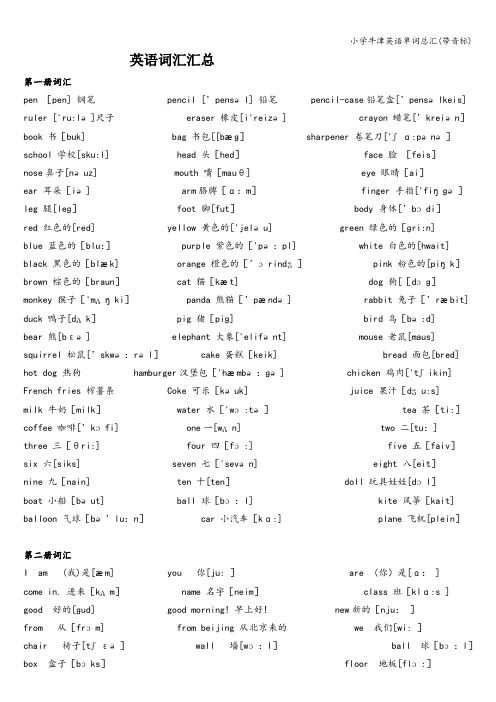
英语词汇汇总第一册词汇pen [pen] 钢笔pencil [’pensəl] 铅笔 pencil-case铅笔盒[’pensəlkeis] ruler ['ru:lə]尺子 eraser 橡皮[i'reizə] crayon 蜡笔[’kreiən]book 书[buk] bag 书包[[bæɡ] sharpener 卷笔刀['ʃɑ:pənə]school 学校[sku:l] head 头[hed] face 脸[feis]nose鼻子[nəuz] mouth 嘴[mauθ] eye 眼睛[ai]ear 耳朵[iə] arm胳膊[ɑ:m] finger 手指['fiŋɡə]leg 腿[leɡ] foot 脚[fut] body 身体[’bɔdi]red 红色的[red] yellow 黄色的['jeləu] green 绿色的[ɡri:n]blue 蓝色的[blu:] purple 紫色的['pə:pl] white 白色的[hwait]black 黑色的[blæk] orange 橙色的[’ɔrindʒ] pink 粉色的[piŋk]brown 棕色的[braun] cat 猫[kæt] dog 狗[[dɔɡ]monkey 猴子['mʌŋki] panda 熊猫[’pændə] rabbit 兔子[’ræbit] duck 鸭子[dʌk] pig 猪[piɡ] bird 鸟[bə:d]bear 熊[bεə] elephant 大象['elifənt] mouse 老鼠[maus]squirrel 松鼠[’skwə:rəl] cake 蛋糕[keik] bread 面包[bred]hot dog 热狗 hamburger汉堡包['hæmbə:ɡə] chicken 鸡肉['tʃikin] French fries 榨薯条 Coke 可乐[kəuk] juice 果汁[dʒu:s]milk 牛奶[milk] water 水['wɔ:tə] tea 茶[ti:]coffee 咖啡[’kɔfi] one一[wʌn] two 二[tu:]three 三[θri:] four 四[fɔ:] five 五[faiv]six 六[siks] seven 七['sevən] eight 八[eit]nine 九[nain] ten 十[ten] doll 玩具娃娃[dɔl]boat 小船[bəut] ball 球[bɔ:l] kite 风筝[kait] balloon 气球[bə’lu:n] car 小汽车[kɑ:] plane 飞机[plein]第二册词汇I am (我)是[æm] you 你[ju: ] are (你)是[ɑ: ]come in. 进来[kʌm] name 名字[neim] class 班[klɑ:s ]good 好的[ɡud] good morning! 早上好! new新的[nju:]from 从[frɔm] from beijing 从北京来的 we 我们[wi: ]chair 椅子[tʃεə] wall 墙[wɔ:l] ball 球[bɔ:l]box 盒子[bɔks] floor 地板[flɔ:]at 在[æt] zoo 动物园[zu:] at the zoo 在动物园里park 公园[pɑ:k] classroom 教室['klɑ:srum] factory工厂[’fæktəri]square 广场[skwεə] capital首都[’kæpitəl] China 中国[’tʃainə]the capital of China 中国的首都 love 爱[lʌv]motherland 祖国[’mʌðəlænd] has有[hæz] star 星[stɑ:]our我们的[’auə] national国家的[’næʃənəl] cap 帽子[kæp]national flag国旗[flæɡ] coat上衣[kəut] have有[hæv]long长的[lɔ:ŋ] short短的,矮的[ʃɔ:t] big大的[biɡ] small小的[smɔ:l] or或, 还是[ɔ: ] guess 猜[ɡes]hey 嗨[hei] tall高的[tɔ:l] old年老的[əuld]young年轻的[jʌŋ] Chinese 中国的;汉语;中国人['tʃai’ni:z] English英国的;英语;英国人[’iŋgliʃ] over 越(过)[’əuvə]there 那儿[ðεə] over there 在那边 American美国的,美国人[ə’merikən]other另外的[’ʌðə] an一(个) [æn] apple苹果[’æpl]orange桔子['ɔrindʒ] hand手[hænd] egg蛋[eɡ] umbrella 伞[ʌm’brelə] school is over。
牛津小学英语1B单词、句子一览表
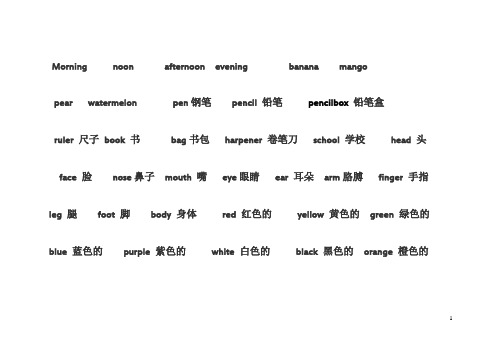
Morning noon afternoon evening banana mangopear watermelon pen钢笔pencil 铅笔pencilbox铅笔盒ruler 尺子book 书bag书包harpener 卷笔刀school 学校head 头face 脸nose鼻子mouth 嘴eye眼睛ear 耳朵arm胳膊finger 手指leg 腿foot 脚body 身体red 红色的yellow 黄色的green 绿色的blue 蓝色的purple 紫色的white 白色的black 黑色的orange 橙色的1pink 粉色的brown 棕色的cat 猫monkey猴子dog 狗panda熊猫rabbit兔子bird 鸟pig 猪duck鸭子bear熊mouse老鼠squirrel 松鼠elephant 大象one 一two 二three 三four 四five 五six 六seven 七eight 八nine 九ten 十Unit 1 What's your name? Unit 2 How are you? Unit 3 Nice to meet youUnit 4 My nice ruler Unit 5 On the road Unit 6 In the parkUnit 7 Open the door, please Unit 8 I can swim Unit 9 Happy birthday!Unit 10 Let's go to the park2Hello. What`s your name? Hi. My name is David.Nancy David Su Yang Liu Tao A a name B b book Hello . What's your name? My name is David .How are you, Helen? I`m fine, thank you .fine well good C c cat D d dogHow are you? I`m fine, thank you .This is my uncle . Nice to meet you . Nice to meet you , too .3grandpa grandma uncle aunt E e evening F f fatherI love yougrandpa , grandma ,I love you .grandpa , grandma ,You love me too .This is…That`s my new ruler . it`s very nice .a pen a crayon a ruler a rubber G g bag H h hand One two three . Put the pen in the pencil box .4is that a taxi ? No , it isn`t .a bus a car a taxi a bikeI i bike J j jump K k kiteI like my bikeI like my bike .I like my kite .I like my bike and my kite .Is this a bus ? No , it isn`t . Is this a bus ? Yes , it is .5What`s this ? it`s a bee .a bee a bird a kite a balloonL l ruler M m mouth N n noseA beeWhat is that ?It`s a bee .It has honeyFor you and me .What`s that ? it`s a bird .6Open the door , please . All right .open the door close the windows stand up sit down O o mango P p pig Q q queueWait in a queuein a queue ,in a queue ,Good boys wait in a queue .7。
小学牛津英语六年级B第4单元单词及造句应用
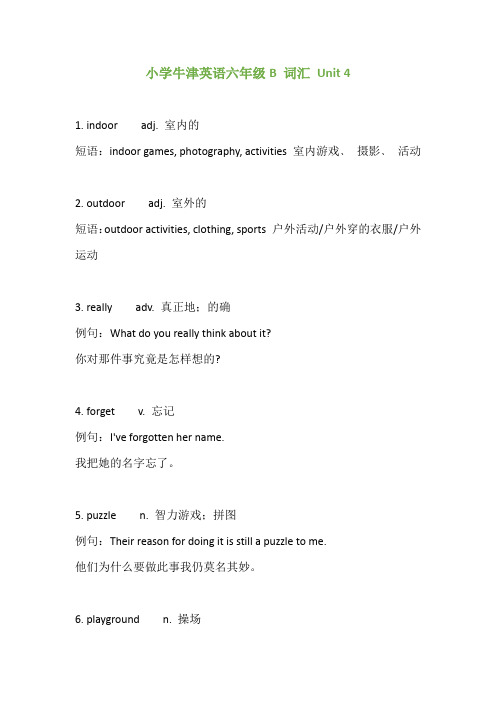
小学牛津英语六年级B 词汇Unit 41. indoor adj. 室内的短语:indoor games, photography, activities 室内游戏﹑摄影﹑活动2. outdoor adj. 室外的短语:outdoor activities, clothing, sports 户外活动/户外穿的衣服/户外运动3. really adv. 真正地;的确例句:What do you really think about it?你对那件事究竟是怎样想的?4. forget v. 忘记例句:I've forgotten her name.我把她的名字忘了。
5. puzzle n. 智力游戏;拼图例句:Their reason for doing it is still a puzzle to me.他们为什么要做此事我仍莫名其妙。
6. playground n. 操场例句:Children are running happily in the playground.孩子们快乐地在操场上奔跑着。
7. piano n. 钢琴短语:play a tune on the piano 用钢琴弹一个曲子8. model n. 模型短语:a model of the proposed new airport 拟建的新机场模型9. health n. 身体(或精神)状况;健康短语:be in/enjoy the best of health 身体非常好10. problem n. 问题;难题;困难例句:We've got a problem with the car, it won't start!我们的汽车出故障了--发动不起来!11. headache n. 头痛例句:I had a really bad headache , and couldn't go to work.我的头真的很疼,我无法工作了。
小学牛津英语4B知识点总结
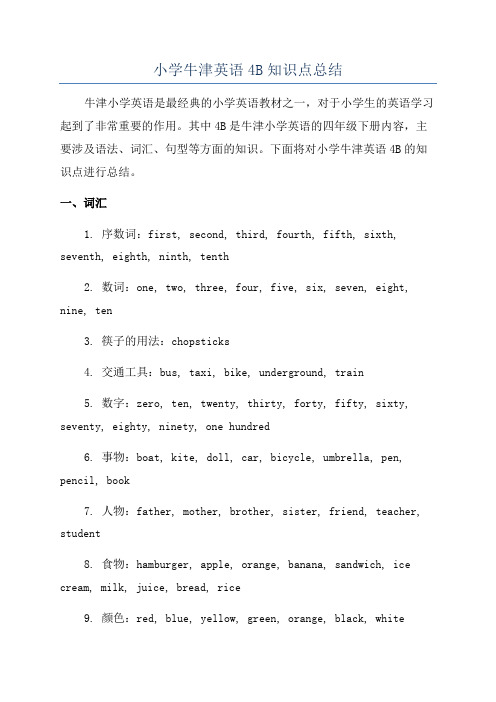
小学牛津英语4B知识点总结牛津小学英语是最经典的小学英语教材之一,对于小学生的英语学习起到了非常重要的作用。
其中4B是牛津小学英语的四年级下册内容,主要涉及语法、词汇、句型等方面的知识。
下面将对小学牛津英语4B的知识点进行总结。
一、词汇1. 序数词:first, second, third, fourth, fifth, sixth, seventh, eighth, ninth, tenth2. 数词:one, two, three, four, five, six, seven, eight, nine, ten3. 筷子的用法:chopsticks4. 交通工具:bus, taxi, bike, underground, train5. 数字:zero, ten, twenty, thirty, forty, fifty, sixty, seventy, eighty, ninety, one hundred6. 事物:boat, kite, doll, car, bicycle, umbrella, pen, pencil, book7. 人物:father, mother, brother, sister, friend, teacher, student8. 食物:hamburger, apple, orange, banana, sandwich, ice cream, milk, juice, bread, rice9. 颜色:red, blue, yellow, green, orange, black, white10. 音乐乐器:piano, violin, guitar, drums, flute11. 动物:dog, cat, monkey, panda, rabbit, bird, fish, elephant, tiger, lion12. 日期:Monday, Tuesday, Wednesday, Thursday, Friday, Saturday, Sunday二、语法1.一般现在时:主语+动词原形/第三人称单数现在时形式;e.g. I like music. He likes music.2. 物主代词:my, your, his, her, itse.g. This is my book.3.反意疑问句:陈述部分否定,疑问部分用否定的形式;陈述部分肯定,疑问部分用肯定的形式。
小学牛津英语六年级B第2单元单词及造句应用
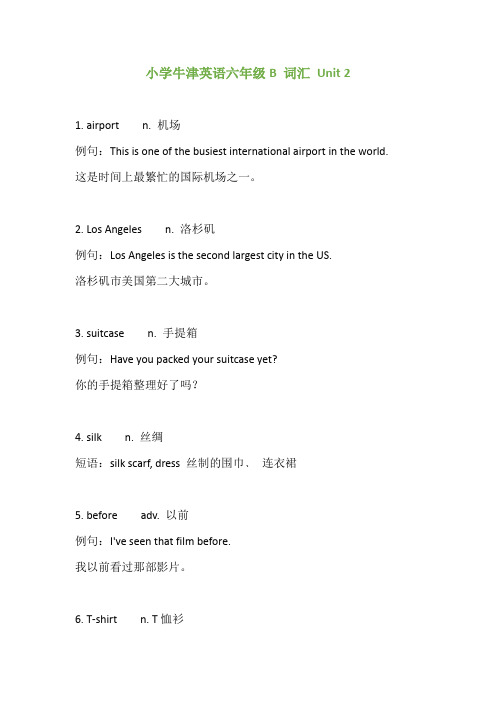
小学牛津英语六年级B 词汇Unit 21. airport n. 机场例句:This is one of the busiest international airport in the world.这是时间上最繁忙的国际机场之一。
2. Los Angeles n. 洛杉矶例句:Los Angeles is the second largest city in the US.洛杉矶市美国第二大城市。
3. suitcase n. 手提箱例句:Have you packed your suitcase yet?你的手提箱整理好了吗?4. silk n. 丝绸短语:silk scarf, dress 丝制的围巾﹑连衣裙5. before adv. 以前例句:I've seen that film before.我以前看过那部影片。
6. T-shirt n. T恤衫例句:She was wearing jeans and a T-shirt.她穿着牛仔裤和T恤衫。
7. several adj. 几个例句:He's written several books about India.他已经写了几本关于印度的书。
8. however adv. 然而例句:She felt ill. She went to work, however, and tried to concentrate.她病了。
然而她照旧去上班, 并且尽力集中精神工作。
9. pack v. 装(箱)例句:Don't forget to pack your toothbrush!别忘了把牙刷放到箱子里去!10. flight n. 航班例句:All flights have been cancelled because of fog.因为有雾所有航班都已取消。
11. passenger n. 乘客;旅客例句:The driver of the car was killed in the crash but both passengers escaped unhurt.事故中汽车司机丧生, 但两名乘客幸未受伤。
牛津小学英语5B_期末复习资料
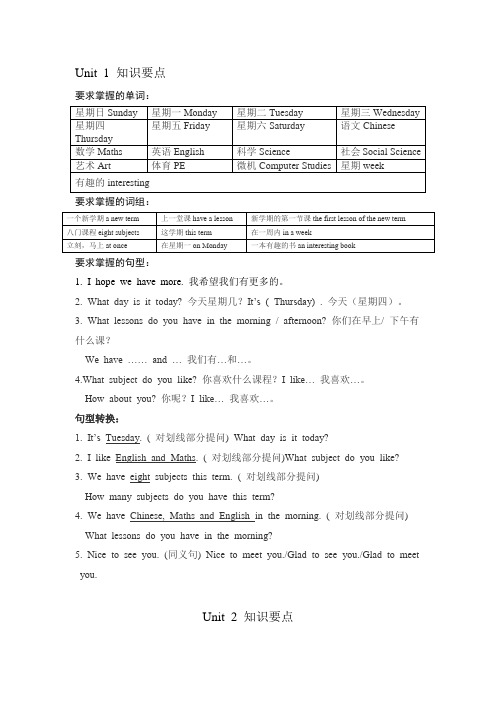
Unit 1 知识要点要求掌握的单词:要求掌握的词组:要求掌握的句型:1. I hope we have more. 我希望我们有更多的。
2. What day is it today? 今天星期几?It’s ( Thursday) . 今天(星期四)。
3. What lessons do you have in the morning / afternoon? 你们在早上/ 下午有什么课?We have …… and …我们有…和…。
4.What subject do you like? 你喜欢什么课程?I like…我喜欢…。
How about you? 你呢?I like…我喜欢…。
句型转换:1. It’s Tuesday. ( 对划线部分提问) What day is it today?2. I like English and Maths. ( 对划线部分提问)What subject do you like?3. We have eight subjects this term. ( 对划线部分提问)How many subjects do you have this term?4. We have Chinese, Maths and English in the morning. ( 对划线部分提问) What lessons do you have in the morning?5. Nice to see you. (同义句) Nice to meet you./Glad to see you./Glad to meet you.Unit 2 知识要点要求掌握的单词:要求掌握的词组:要求掌握的句型:1. Why are you absent today?你今天为什么缺席?(相当于Why are you not here today?)2. See you soon. 一会见。
上海小学牛津英语语法归纳总结
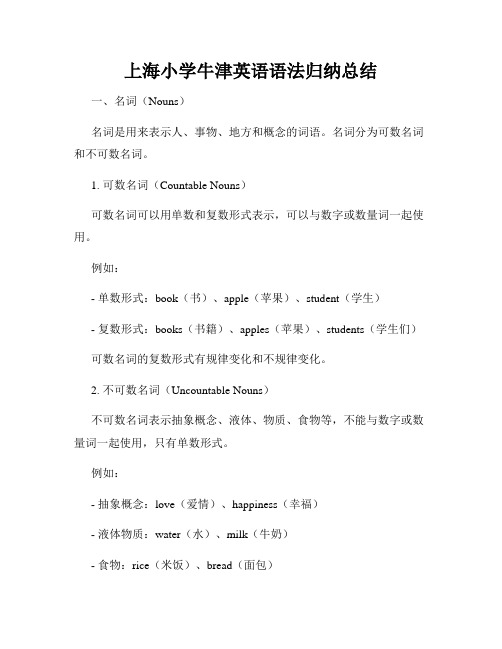
上海小学牛津英语语法归纳总结一、名词(Nouns)名词是用来表示人、事物、地方和概念的词语。
名词分为可数名词和不可数名词。
1. 可数名词(Countable Nouns)可数名词可以用单数和复数形式表示,可以与数字或数量词一起使用。
例如:- 单数形式:book(书)、apple(苹果)、student(学生)- 复数形式:books(书籍)、apples(苹果)、students(学生们)可数名词的复数形式有规律变化和不规律变化。
2. 不可数名词(Uncountable Nouns)不可数名词表示抽象概念、液体、物质、食物等,不能与数字或数量词一起使用,只有单数形式。
例如:- 抽象概念:love(爱情)、happiness(幸福)- 液体物质:water(水)、milk(牛奶)- 食物:rice(米饭)、bread(面包)不可数名词没有复数形式,不能直接与冠词a/an连用。
二、冠词(Articles)冠词用于限定名词的范围,分为定冠词和不定冠词。
1. 定冠词(Definite Article)定冠词是"the",用于特指已经提到的人或物,或者特指上下文中的某人或某物。
例如:- I saw a cat in the tree.(我看到树上有一只猫)- The cat was black.(那只猫是黑色的)2. 不定冠词(Indefinite Article)不定冠词有两种,分别是"a"和"an"。
用于泛指某一类人或物。
例如:- I have a dog.(我有一只狗)- She is an actress.(她是一名女演员)不定冠词"a"后面接辅音音素开头的词,"an"后面接元音音素开头的词。
三、形容词(Adjectives)形容词用来描述名词的特征和性质。
形容词通常位于名词之前。
- a big house(一个大房子)- a beautiful flower(一朵美丽的花)形容词可以用于比较级和最高级。
上海牛津重点小学英语语法知识总结归纳
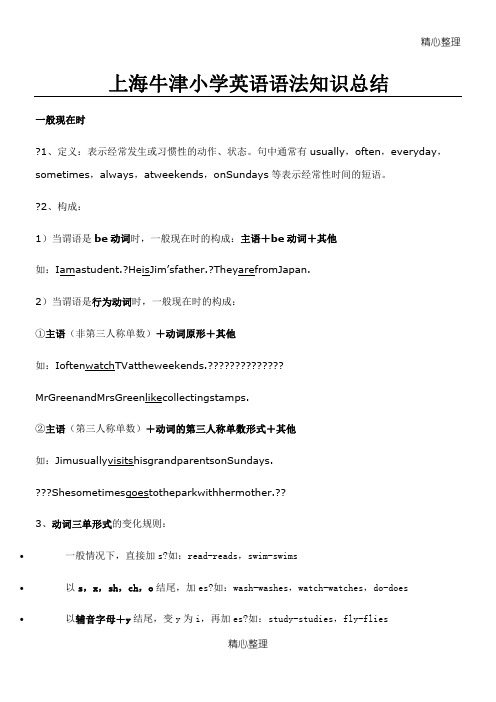
精心整理•一般情况下,直接加s?如:read-reads,swim-swims•以s,x,sh,ch,o结尾,加es?如:wash-washes,watch-watches,do-does•以辅音字母+y结尾,变y为i,再加es?如:study-studies,fly-flies•不规则变化如:have-has•4、一般现在时的句型转换:肯定句否定句一般疑问句及回答They watch TV everyday. They don’twatch TVeveryday.—Do they watch TVeveryday?—Yes,they do./No,they don’t.She watches TVShe doesn’t?watch—Does she watch TVeveryday?如:read-reading,drink-drinking,eat-eating,look-looking•以不发音的e结尾的动词,去掉e,再加ing如:write-writing,make-making,ride-riding,take-taking•以重读闭音节结尾,如末尾只有一个辅音字母,要双写这个字母,再加ing如:sit-sitting,swim-swimming,put-putting,run-running,stop-stopping,get-getting,2、构成:主语+动词的过去式+其他3、动词过去式的变化规则:肯定句否定句一般疑问句及回答—Did he watch TVyesterday? He watched TVyesterday. He didn’twatch TVyesterday.—Yes,he did./No,he didn’t.—Did they play gamesjustnow? They played gamesjustnow. They didn’tplay gamesjustnow.—Yes,they did./No,they didn’t. 一般将来时1、定义:表示将要发生的动作或存在的状态,以及打算、计划或准备某事。
牛津小学英语3A-6B词汇表

小学英语词汇表Aa /ei; ə/an /æn,ən/ 一(个,件)aah /ɑ:/ “啊”的喊叫声about /ə’baʊt/ 关于;对于absent /æbsənt/ 缺席的;不在场的accordion /ə’kɔ:djən/ 手风琴address /ə’dres/ 地址Africa / ‘æfrikə/ 非洲after /’ɑ:ftə/ 在……以后;在……后面afternoon /‘ɑ:ftə’nu:n/ 下午,午后again /ə’ɡein/ 又;再age /eidʒ/ 年龄ago /ə’ɡəu/ 以前ah /ɑ:/ 啊;呀airport /‘ɛəpɔ:t/ 飞机场Aladdin /ə’lædin/ 阿拉丁all /ɔ:l/ 都;完全;全体;全部along /ə’lɔŋ/ 沿着;顺着;一道;一起also /‘ɔ:lsəu/ 也always /‘ɔ:lweiz/ 总是;一直America /ə’merikə/ 美国American /ə’merikən / 美国人的and /ænd; ənd/ 和;又;而animal /‘æniməl/ 动物answer /‘ɑ:nsə/ 回答ant /ænt/ 蚂蚁any /’eni/ (用于否定句、疑问句等)什么;一些;任何的apple /‘æpl/ 苹果April /‘eiprəl/ 四月arm /ɑ:m/ 手臂;胳膊around /ə’raund/ 在……周围;环绕着art /ɑ:t/ 艺术;艺术品as /æz, əz/ 按照;因为;由于;作为ask /ɑ:sk/ 问at /æt, ət/ 在……August /‘ɔ:ɡəst/ 八月aunt /ɑ:nt/ 姨母;舅母;姑母;伯母;婶母Australia /ɔ:’streɪljə/ 澳大利亚Australian /ɔ:’streɪljən/ 澳大利亚人autumn /‘ɔ:təm/ 秋天;秋季away /ə’wei/ 离开Bback /bæk/ 回(原处);向后backache /‘bækˌeɪk/ 背痛bad /bæd/ 坏的bag /bæɡ/ 书包;提包;口袋ball /bɔ:l/ 球ball pen /bɔ:l pen/ 圆珠笔balloon /bə’lu:n/ 气球banana /bə’nɑ:nə/ 香蕉bar /bɑ:/ 条;棒;棒状物baseball /‘beisbɔ:l]/ 棒球basket /bɑ:skit/ 篮子basketball /‘bɑ:skitbɔ:l/ 篮球bathroom /‘bɑ:θrum/ 浴室be /bi:/ 是beach /bi:tʃ/ 海(河、湖)滩bear /bɛə/ 熊beautiful /‘bju:təful/ 美丽的beautifully /‘bju:təfuli/ 漂亮的because /bi’kɔz/ 因为bed /bed/ 床bedroom /‘bedrum/ 卧室bee /bi:/ 蜜蜂before /bi’fɔ:/ 在……之前;以前begin /bi’ɡin/ 开始;着手behind /bi’haind/ 在……后面belt /belt/ 皮带bend /bend/ 使弯曲beside /bi’said/ 在……旁边better /‘betə/ 较好的;更好的between /bi’twi:n/ 在(两者)之间big /biɡ/ 大的bike /baik/ 自行车bird /bə:d/ 鸟birthday /‘bɜ:θdeɪ/ 生日biscuit /‘biskit/ 饼干black /blæk/ 黑色(的)blackboard /‘blækbɔ:d/ 黑板blanket /‘blæŋkit/ 毛毯;毯子blow /bləu/ 吹blue /blu:/ 蓝色(的)book /buk/ 书bookcase /‘bʊkˌkeɪs/ 书橱;书箱bookmark /‘bʊkˌmɑ:k/ 书签bookshop /‘bukʃɔp/ 书店bored /bɔ:d/ 厌倦的;厌烦的both /bəuθ/ 两个(人……)都bottle /‘bɔtl/ 瓶bowl /’bəul/ 碗box /bɔks/ 盒子;箱子boy /bɔi/ 男孩brave /breiv/ 勇敢的bread /bred/ 面包breakfast /’brekfəst/ 早餐bright /brait/ 明亮的;灿烂的British /’britiʃ/ 英国的;英国人的brother /’brʌðə/ 兄;弟brown /braun/ 棕色(的);褐色(的)brush /brʌʃ/ 刷子;毛笔;画笔building /’bildiŋ/ 建筑物bus /bʌs/ 公共汽车busy /’bizi/ 忙的;繁忙的but /bət, bʌt/ 但是;除了butterfly /’bʌtəflai/ 蝴蝶buy /bai/ 买by /bai/ 乘车(船等);用(手段、方法)bye /bai/ 再见C cage /keidʒ/ 笼子;鸟笼cake /keik/ 蛋糕;饼;糕calculator /’kælkjuleitə/ 计算器call /kɔ:l/ 称呼;叫喊;打电话给……;电话;通话;camera /’kæmərə/ 照相机camp /kæmp/ 野营;营地can /kæn, kən/ 能;可以;会candle /’kændl/ 蜡烛cap /kæp/ 便帽;军帽car /kɑ:/ 汽车;小汽车card /kɑ:d/ 纸牌;卡片carefully /’kɛəfulɪ/ 小心地;仔细地carrot /’kærət/ 胡萝卜carry /’kæri/ 携带;搬运;运送carton /’kɑ:tən/ 纸板盒;纸箱cartoon /kɑ:’tu:n/ 动画片;卡通cat /kæt/ 猫catch /kætʃ/ 捉;抓住centimeter /’sentimi:tər/ 厘米centre(center) /‘sentə/ 中心chair /tʃɛə/ 椅子change /tʃeindʒ/ 变换;变更;改变chat /tʃæt/ 闲聊;聊天cheese /tʃi:z/ 乳酪chicken /’tʃikin/ 鸡;肌肉child /tʃaild/ 小孩(复数:children /’tʃildrən/)China /’tʃainə/ 中国Chinese /’tʃai’ni:z/中国的;中国人的;中国人;汉语chips /tʃips/ 炸土豆条chocolate /’tʃɔkəlit/ 巧克力;巧克力糖chopsticks /’tʃɔpstɪks/ 筷子Christmas /’krisməs/ 圣诞节cicada /si’kɑ:də/ 蝉cinema /’sinimə/ 电影院;电影circle /’sə:kl/ 圈子;圆city /’siti/ 城市class /klɑ:s/ 班级;同一个班的学生classmate /klɑ:smeit/ 同班同学classroom /’klɑ:srum/ 教师clean /kli:n/ 把……弄干净;擦干净;干净的;清洁的climb /klaim/ 爬;攀登;登山climbing /’klaimiŋ/ 爬山;登山clock /klɔk/ 钟close /kləuz/ 关;闭clothes /kləuðz/ 衣服club /klʌb/ 俱乐部;社团coat /kəut/ 外套;上衣coffee /’kɔfi/ 咖啡coin /kɔin/ 硬币cold /kəuld/ 冷的;寒冷的collect /kə’lekt/ 收集;搜集colour /’kʌlə/ 颜色;给……着色colourful / ‘kʌləful/ 颜色丰富的;艳丽comb /kəum/ 梳子come / kʌm / 来computer /kəm’pju:tə/ 电脑;电子计算机concert /’kɔnsət/ 音乐会;演奏会contest /’kɔntest/ 竞赛;比赛cook /kuk/ 烹调;煮;烧cool /ku:l/ 凉的;凉快的;了不起的copy /’kɔpi/ 抄写;誊写copybook /’kɔpi:ˌbʊk/ 抄写本corner /’kɔ:nə/ 角落;拐角costume /’kɔstju:m/ 服装;戏服cough /kɔf/ 咳嗽country /’kʌntri/ 国家;乡村;郊外countryside /’kʌntrisaid/ 乡下;农村cousin /’kʌzn/ 堂(表)兄弟;堂(表)姐妹cow /kau/ 母牛;乳牛crayon /’kreiən/ 蜡笔cream /kri:m/ 奶油;乳脂cricket /’krikit/ 蟋蟀crossing /’krɔsiŋ/ 十字路口;交叉点cry /krai/ 哭;叫喊cup /kʌp/ 杯子cupboard /’kʌbəd/ 碗橱;小厨(柜)cycle /’saikl/ 骑自行车cute /kju:t/ 漂亮的;逗人喜爱的Ddad /dæd/ 爸爸dance /’dɑ:ns/ 跳舞danger /’deindʒə/ 危险date /deit/ 日期daughter /’dɔ:tə/ 女儿day /dei/ 日;一天dear /diə/ (表示惊讶等)哎呀;亲爱的;可爱的December /di’sembə/ 十二月delicious /di’liʃəs/ 美味的;可口的desk /desk/ 书桌diamond /’daiəmənd/ 钻石diary /’daiəri/ 日记different /’difrənt/ 差异的;不同的dining-room /’daɪnɪŋru:m/ 餐厅dinner /’dinə/ 正餐;晚餐do /du:, du/ 构成否定句、疑问句的助动词;做;干;行动doctor /’dɔktə/ 医生dog /dɔɡ/ 狗doll /dɔl/ 玩具娃娃door/dɔ:/ 门doorbell /’dɔ:ˌbel/ 门铃down /daun/ 向下dragon /’dræɡən/ 龙dragonfly /’dræɡənˌflai/ 蜻蜓draw /drɔ:/ 画;绘制dress /dres/ 女装;(统指)衣服drink /drɪŋk/ 喝driver /’draivə/ 司机;驾驶员duck /dʌk/ 鸭dumpling /’dʌmpliŋ/ 汤团;团子Eeach /i:tʃ/ 各自;各个ear /iə/ 耳朵earache /’iəreik/ 耳痛early /’ə:li/ 早的;初期earphone /’iəfəun/ 耳机Easter /’i:stə/ 复活节easy /’i:zi/ 容易的eat /i:t/ 吃egg /eɡ/ 蛋eight /eɪt/ 八eighteen /’eɪ’ti:n/ 十八eighty /’eɪtɪ/ 八十elephant /’elifənt/ 大象ele ven /i’levən/ 十一else /els/ 别的;其他(的)E-mail /’i:meil/ 电子邮件engineer /ˌendʒi’niə/ 工程师England /’ɪŋglənd/ 英格兰;英国English /’iŋɡliʃ/ 英国;英国人;英国的;英国人的envelope /’enviləup/ 信封er /ə:/ 呃;啊;这……evening /’i:vniŋ/ 傍晚;晚上every /’evri/ 每一;每个的everybody /’evr ibɔdi/ 每人;人人everything /’evriθiŋ/ 每件事;每样东西;一切excited /ik’saitid/ 兴奋的;激动的exciting /ik’saitiŋ/ 令人兴奋的excuse /iks’kju:z / 原谅/iks’kju:s/ 借口;托辞exercise /’eksəsaiz/ 练习;做操;锻炼eye /ai/ 眼睛F face /feis/ 脸;面孔family /’fæmili/ 家;家庭fan /fæn/ (口语)(电影、运动等的)狂热爱好者far /fɑ:/ 远(的)farm /fɑ:m/ 农场;农庄farmer /’fɑ:mə/ 农民fast /fɑ:st/ 快(的);迅速(的)fat /fæt/ 肥胖的father /’fɑ:ðə/ 父亲favourite /’feivərit/ 最喜欢的fax /fæks/ 传真February /’februəri/ 二月feel /fi:l/ 觉得;感到festival /’festəvəl/ 节日(的);喜庆(的)fever /’f i:və/ 发烧field /fi:ld/ 地;田地fifteen /’fif’ti:n/ 十五fifth /fifθ/ 第五(的)fifty /’fifti/ 五十fight /fait/ 打架film /film/ 影片;电影find /faind/ 找到;发现fine /fain/ 好的;(身体)好的finger /’fiŋɡə/ 手指finish /’finiʃ/ 完成;结束firefly /’faɪəˌflaɪ/ 萤火虫first /fə:st/ 第一;首先;最初fish /fiʃ/ 鱼fishing /’fiʃiŋ/ 钓鱼five /faiv/ 五floor /flɔ:/ (室内)地;地板flower /’flauə/ 花fly /flai/ 飞;飞行;乘飞机旅行;放……飞foggy /’fɔɡi/ 有雾的;多雾的follow /’fɔləu/ 跟随food /fu:d/ 食物foot /fut/ 脚football /’futbɔ:l/ 足球for /fɔ:/ 为;给forget /fə’ɡet/忘记fork /fɔ:k/ 叉;餐叉forty /’fɔ:ti/ 四十four /fɔ:/ 四fourteen /’fɔ:’ti:n/ 十四fourth /fɔ:θ/ 第四France /frɑ:ns/ 法国free /fri: 空闲的;自由的French /frentʃ/ 法语;法国的Friday /’fraidi/ 星期五fridge /fridʒ/ 电冰箱friend /frend/ 朋友from /frɔm/ 从;从……起fruit /fru:t/ 水果fun /fʌn/ 有趣的;愉快的;乐趣;娱乐funny /’fʌni/ 滑稽的;有趣的further /’fə:ðə/ 更远的G game /ɡeim/ 游戏;运动garden /’ɡɑ:dn/ 花(果、菜)园gate /ɡeit/ 大门get /ɡet/ 得到;获得girl /ɡə:l/ 女孩give /ɡiv/ 给glad /ɡlæd/ 高兴的;乐意的glass /ɡlɑ:s/ 玻璃杯glasses /’ gl ɑ:sɪz/ 眼镜glove /ɡlʌv/ 手套glow /ɡləu/ 发光glue /ɡlu:/ 胶水;胶粘物go /ɡəu/ 去goal /ɡəul/ (足球)球门;得分goalkeeper /’ɡəʊlki:pə/ (足球、曲棍球等运动的)守门员goldfish /’gəʊldˌfɪʃ/ 金鱼good /ɡʊd/ 好的goodbye /ˌɡud’bai/ 再见;再会grandfather /’ɡrændˌfɑ:ðə/ (外)祖父grandma /’ɡrænmɑ:/ (口语)奶奶;外婆g randmother /’ɡrændˌmʌðə/(外)祖母grandpa /’ɡrænpɑ:/ (口语)爷爷;外公grandparents /’ɡrændˌpɛərənts/ (复)祖父母;外祖父母grass /ɡrɑ:s/ 草;草地grasshopper /’græsˌhɔpə/ 蚱蜢great /ɡreit/ 好极了;伟大的;很大的;重大的green /ɡri:n/ 绿色(的)ground /ɡraund/ 地面;土地group /ɡru:p/ 组;群;团体grow /ɡrəu/ 种植;生长guess /ɡes/ 猜guitar /ɡi’tɑ:/ 吉他Hhair /hɛə/ 头发hairdryer /’heədraɪə/ (吹干头发用的)吹风机half /hɑ:f/ 半;一半Halloween /’hæləu’i:n/ 万圣节前夕hamburger /’hæmbə:ɡə/ 汉堡包hand /hænd/ 手handkerchief /’hæŋkətʃi:f/ 手帕happy /’hæpi/ 快乐的;幸福的hat /hæt/ 帽子have /hæv; həv/ 有he /hi:/ 他head /hed/ 头;头部headache /’hedeik/ 头痛hear /hiə/ 听见;听说heart /hɑ:t/ 心(脏)heavy /’hevi/ 重的hello /he’ləu/ 喂(表示问候或唤起注意)help /help/ 帮助her /hə:,hə/ 她的;她(宾格)here /hiə/ 这里;这儿hers /hə:z/ 她的hey /hei/ 嘿;喂(唤起注意,表示惊讶或询问的声音)hi /hai/ 喂(表示问候或唤起注意)high /hai/ 高的(地)hill /hil/ 小山him /him/ 他(宾格)his /hiz/ 他的history /’histəri/ 历史(学)hmm /hm/ 哼(表示踌躇、唤起注意)hobby /’hɔbi/ 业余爱好holiday /’hɔlədi/ 假日;假期home /həum/ 家homework /’həumwə:k/ 家庭作业hope /həup/ 希望horse /hɔ:s/ 马hospital /’hɔspitl/ 医院hot /hɔt/ 热的;辣的house /haus/ 房子housewife /’hauswaif/ 家庭主妇housework /’hauswə:k/ 家务劳动how /hau/ (指程度)多少;怎样hundred /’hʌndrəd/ 百hungry /’hʌŋɡri/ 饥饿的hurry /’hʌri/ 赶快;慌忙II /ai/ 我ice /ais/ 冰icecream /’aɪskri:m/ 冰淇淋ill /il/ 病的,不健康的in /in/ 在……里(内;上)用……表示insect /’insekt/ 昆虫interesting /’intristiŋ/ 有趣的;有意思的Internet /’intənet/ 因特网;互联网络it /it/ 它its /its/ 它的J jacket /’dʒækit/ 茄克衫January /’dʒænjuəri/ 一月Japan /dʒə’pæn/ 日本Japanese /dʒæpə’ni:z/日本的;日本人的;日本人;日语的jeans /dʒi:nz/ 牛仔裤job /dʒɔb/ 工作jog /dʒɔɡ/ 慢跑join /dʒɔin/ 加入;参加juice /dʒu:s/ 汁;果汁July /dʒu(u:)’lai/ 七月jump /dʒʌmp/ 跳June /dʒu:n/ 六月just /dʒʌst/ 刚刚;方才K keep /ki:p/ 保持;留住;饲养;照顾keeper /’ki:pə/ 看守人key /ki:/ 钥匙kick /kik/ 踢kilo /’kiləu/ 千克;干净kilometre,kilometer /’kiləmi:tə/ 公里;千米kitchen /’kitʃin/ 厨房kite /kait/ 风筝knee /ni:/ 膝盖knife /naif/ 小刀know /nəu/ 知道;懂得koala /kəu’ɑ:lə/ 树袋熊;考拉L lake /leik/ 湖lamp /læmp/ 灯lantern /’læntən/ 灯笼large /lɑ:dʒ/ 大的;(数量)多的last /lɑ:st/ 最后的;刚过去的;最后;持久;耐久late /leit/ 迟(的);晚(的)laugh /lɑ:f/ (大)笑;发笑learn /lə:n/ 学;学习left /left/ 左(的);左边(的)leg /leɡ/ 腿lemon /’lemən/ 柠檬lesson /’lesn/ 课;功课let /let/ 让letter /’letə/ 信;字母library /’laibrəri/ 图书馆lie /lai/ 躺;平躺light /lait/ 轻的like /laik/ 像;跟……一样line /lain/ 线;绳索lion /’laiən/ 狮子listen /’lisn/ 听litter /’litə/ 垃圾;废物;乱丢杂物little /’litl/ 小的;一点儿;稍许live /laiv/ 居住London /’lʌndən/ 伦敦long /lɔŋ/ 长的look /luk/ 瞧;看lot /lɔt/ 许多loudly /’laʊdlɪ/ 大声的;高声的love /lʌv/ 喜爱;爱low /ləu/ 低的;浅的;矮的lunch /lʌntʃ/ 午餐M machine /mə’ʃi:n/ 机器magazine /ˌmæɡə’zi:n/ 杂志make /meik/ 做;制作;使…….(发生)man /mæn/ 男人;人mango /’mæŋɡəu/ 芒果;芒果树many /’meni/ 许多的;许多map /mæp/ 地图marble /’mɑ:bl/ 玻璃弹子March /mɑ:tʃ/ 三月mask /mɑ:sk/ 面具match /mætʃ/ 比赛;竞赛maths /mæθs/ 数学May /mei/ 五月me /mi:ˌmi/ 我(宾格)mean /mi:n/ 表示……的意思;意味着medicine /’medisin/ 内服药;医药meet /mi:t/ 见面;会面;遇见meeting /’mi:tiŋ/ 会;集会metro /’metrəʊ/ 地铁middle /’midl/ 中间的;中级的milk /milk/ 牛奶mine /main/ 我的minibus /’mɪniˌbʌs/ 小型公共汽车minus /’mainəs/ 减(去)minute /’minit/ 分钟;一会儿mirror /’mirə/ 镜子Miss /mis/ 女士;小姐miss /mis/ 错过mobile /’məubail/ 可移动的model /’mɔdl/ 模型;模范;样式moment /’məumənt/ 片刻;瞬间Monday /’mʌndi/ 星期一monkey /’mʌŋki/ 猴子month /mʌnθ/ 月;月份moon /mu:n/ 月亮more /mɔ:/ 更多(的);更加morning /’mɔ:niŋ/ 早晨;上午mother /’mʌðə/ 母亲motorcycle /’məutəsaikl/ 摩托车mountain /’mauntin/ 山;高山mouse /maus/ 鼠;耗子;鼠标mouth /mauθ/ 嘴move /mu:v/ 移动;搬动;搬家Mr=mister /’mistə/ 先生(用于姓名前)much /mʌtʃ/ 多;很;非常mum /mʌm/ (口语)妈妈museum /mju(u:)’ziəm/ 博物馆music /’mju:zik/ 音乐;乐曲must /mʌst/ 必须;应当my /mai/ 我的N name /neim/ 名字national /’næʃənəl/ 国家的;人民的;民族的near /niə/ 接近;靠近nearby /’niəbai/ 在附近neck /nek/ 颈;脖子need /ni:d/ 需要;必要new /nju:/ 新的newspaper /’nju:speipə/ 报纸next /nekst/ 下一个nice /nаis/ 令人愉快的;好的;漂亮的night /nait/ 夜;夜间nine /nain/ 九ninteen /’nain’ti:n/ 十九ninety /’nainti/ 九十no /nəu/ 不;不是No. /‘nʌmbə/=number 数字nobody /’nəubədi/ 没有人noise /nɔiz/ 噪杂声;响声noodle /’nu:dl/ 面条nose /nəuz/ 鼻子not /nɔt/ 不note /nəut/ 钞票;纸币notebook /’nəutbuk/ 笔记簿noticeboard /’nəutisbɔ:d/ 布告板;布告栏November /nəu’vembə/ 十一月now /nau/ 现在number /’nʌmbə/ 数字;号码nurse /nə:s/ 护士O o’clock /ə’klɔk/ ……点钟October /ɔk’təubə/ 十月of /ɔv, əv/ ……的office /’ɔfis/ 办公室often /’ɔfn/ 常常oh /əʊ/ 哦;啊OK /’əʊ’keɪ/ (口语)好;对;不错;可以old /əuld/ ……岁的;老的on /ɔn/ 在;在……上;关于only /’əunli/ 仅仅;只open /’əupən/ 打开;开着的opera /’ɔpərə/ 歌剧or /ɔ:/ 或者;还是orange /’ɔrindʒ/ 橙子;橘子;橙色(的)order /’ɔ:də/ 订货单;订购;(点)一份菜other /’ʌðə/ 别的;其他的our /’auə/ 我们的ours /’auəz/ 我们的out /aut/ 在外outing /’autiŋ/ 短途旅行;远足oval /’əuvəl/ 椭圆;椭圆形的over /’əuvə/ 在那边;在另一边;结束;完了P pair /pɛə’/ 一对;一双panda /’pændə/ 熊猫paper /’peipə/ 纸;报纸parent /’pɛərənt/ 父(母)亲park /pɑ:k/ 公园party /’pɑ:ti/ 聚会pass /pɑ:s/ 传递past /pɑ:st/ 过去(的);(超)过;经过PE /’pi: ‘ i:/ 体育peach /pi:tʃ/ 桃子pear /pɛə/ 梨pen /pen/ 钢笔pencil /‘pensl/ 铅笔pencil-box / ‘pensl bɔks / 铅笔盒pencil-case / ‘pensl keis / 铅笔袋penfriend /‘penfrend /(不见面的)通信朋友;笔友people /‘pi:pl / 人;人们perhaps /pə’hæps / 也许;可能photo /‘fəutəu / 照片piano /pi’ænəu / 钢琴pick /pik / 采摘(花;果实)picnic /‘piknik / 野餐picture /‘piktʃə / 图画;照片pie /pai / (肉或水果的)馅饼pillow /‘piləu / 枕头pineapple /‘painˌæpl / 菠萝plan /plæn / 计划plane /plein / 飞机plant /plɑ:nt / 种植;植物plate /pleit / 盘子;碟子play /plei / 玩;打(球)剧;喜剧player /‘pleiə / 比赛者;选手playground /‘pleiɡraund / (学校的)操场please /pli:z / 请pocket /‘pɔkit / 衣袋point /pɔint / 指;指向police /pə’li:s / 警察(局)policeman /pə’li:smən / 警察policewoman /pə’li:sˌwʊmən / 女警察popular /‘pɔpjulə / 大众的;流行的postcard /‘pəustkɑ:d / 明信片postmen /pəutmən/ 邮递员pot /pɔt/ 锅primary /’praiməri/ 初级的;初步的problem /’prɔbləm/ 问题;难题project /’prɔdʒekt/ (学校的)课题public /’pʌblik/ 公共的;公众的pull /pul/ 拉;拖;拔pumpkin /’pʌmpkin/ 南瓜puppet /’pʌpit/ 木偶purse /pə:s/ 钱包put /pʌt/ 放puzzle /’pʌzl/ (拼图等)智力玩具Q quarter /’kwɔ:tə/ 一刻钟;四分之一question /’kwestʃən/ 问题quick /kwik/ 快的;迅速的quickly /’k wɪklɪ/ 快的;迅速的quiet /’kwaiət/ 安静的;平静的quietly /’k waɪətlɪ/ 安静的;平静地R rabbit /’ræbit/ 兔子radio /’reidiəu/ 收音机rain /rein/ 下雨;雨rainy /’reini/ 多雨的;下雨的read /ri:d/ 读;阅读ready /’redi/ 准备好的;乐意的really /’riəli/ 确实;真正地receive /ri’si:v/ 接受;收到;得到recorder /ri’kɔ:də/ 录音机rectangle /’rektæŋɡl/ 长方形red /red/ 红色(的)relative /’r elətiv/ 亲属;亲戚rest /rest/ 休息rice /rais/ 米饭;大米ride /raid/ 骑(自行车、马等)right /rait/ 对的;正确的;正好;恰好;右(的);右边(的)ring /riŋ/ (钟、铃等)响;摇铃road /rəud/ 道路;公路roll /rəul/ 卷;卷状物row /rau/ (一)排;(一)行rowing /’rəuiŋ/ 划船rubber /’rʌbə/ 橡皮;橡胶ruler /’ru:lə/ 尺子run /rʌn/ 跑running /’rʌnɪŋ/ 跑步S same /seim/ 同样的;同一的sandwich /’sænwidʒ/ 三明治;夹心面包片say /sei/ 说;讲scarf /skɑ:f/ 围巾school /sku:l/ 学校schoolbag /’sku:lˌbæg/ 书包science /’saiəns/ (自然)科学score /skɔ:/ (比赛)得分;获胜season /’si:zn/ 季节seat /si:t/ 座位second /’sekənd/ 第二(的)see /si:/ 看见;看到seesaw /’si:sɔ:/ 跷跷板September /səp’tembə/ 九月seven /’sevən/ 七seventeen /’sevən’ti:n/ 十七seventy /’sevənti/ 七十shape /ʃeip/ 形状;外形sharpener /’ʃɑ:pənə/ 卷笔刀she /ʃi:, ʃi/ 她ship /ʃip/ 船;轮船shoe/ʃu:/ 鞋shoot /ʃu:t/ 射击;射死shop /ʃɔp/ 商店shopping /’ʃɔpiŋ/ 买东西short /ʃɔ:t/ 短的;矮的shorts /ʃɔ:ts/ 短裤should /ʃud, ʃəd/ 将shoulder /’ʃəuldə/ 肩膀shout /ʃaut/ 呼喊;喊叫show /ʃəu/ 给……看;出示;演出;展览sign /sain/ 标记;符号;痕迹sing /siŋ/ 唱;唱歌sir /sə:, sə/ 先生;阁下sister /’sistə/ 姐;妹sit /sit/ 坐site /sait/ 地点;现场sitting-room /’sɪtɪŋru:m/ 客厅;起居室six /siks/ 六sixteen /’siks’ti:n/ 十六sixth /’siksθ/ 第六(的)sixty /’siksti/ 六十skate /skeit/ 滑冰;溜冰skateboard /’skeitˌbɔ:d/ 滑板skating /’skeitiŋ/ 滑冰ski /ski:/ 滑雪skiing /’ski:iŋ/ 滑雪skirt /skə:t/ 女裙sleep /sli:p/ 睡;睡觉slide /slaid/ 滑梯;滑道slow /sləu/ 慢的;缓慢的;慢慢地;放慢;减速small /smɔ:l/ 小的smart /smɑ:t/ 好看的;漂亮的;时髦的smoke /sməuk/ 吸烟snack-bar /’snæk bɑ:/ 小吃店;快餐柜(部)snow /snəu/ 下雪;雪snowball /’snəʊˌbɔ:l/ 雪球snowman /’snəʊˌmæn/ 雪人snowy /’snəʊi/ 多雪的;降雪的so /səu/ 这么;那么;这样;如此social /’səuʃl/ 社会上的;社交的socks /sɔks/ 短袜sofa /’səufə/ 沙发soft /sɔft/ 不含酒精成分的;软性的;柔软的some /sʌm/ 一些;若干something /’sʌmθiŋ/ 某事(物);某东西sometimes /’sʌmtaimz/ 有时son /sʌn/ 儿子song /sɔŋ/ 歌;歌曲;歌谣songbook /’sɔŋ buk/ 歌本;歌曲集soon /su:n/ 不久;一会儿sorry /’sɔri/ 对不起;抱歉的speak /spi:k/ 讲;说spend /spend/ 花(时间、钱);度过spoon /spu:n/ 匙;调羹sport /spɔ:t/ 运动spring /spriŋ/ 春天square /skwɛə/ 正方形;广场stamp /stæmp/ 邮票stand /stænd/ 站;立stapler /’steiplə/ 订书机star /stɑ:/ 星星;恒星start /stɑ:t/ 开始;着手station /’steiʃən/ 车站;所;站stay /stei/ 停留(在某处)still /stil/ 还;仍旧;更stomach /’stʌmək/ 胃story /’stɔ:ri/ 故事story-book /’stɔ:ribuk/ 故事书stove /stəuv/ 火炉;煤炉、电炉strawberry /’strɔ:bəri/ 草莓street /stri:t/ 街道strong /strɔŋ/ 强壮的;坚强的student /’stju:dənt/ 学生study /’stʌdi/ 学习;研究;书房subject /’sʌbdʒikt/ 题目;题材suddenly /’s ʌdnlɪ/ 突然地summer /’sʌmə/ 夏天;夏季Sunday /’sʌndi/ 星期日sunny /’sʌni/ 晴朗的;阳光充足的supermarket /’sju:pəˌmɑ:kit/ 超级市场supper /’sʌpə/ 晚餐sure /’ʃuə/ 的确;一定;确信的,一定的surf /sə:f/ 冲浪sweater /’swetə/ 毛衣;厚运动衫sweep /swi:p/ 扫;扫除sweet /swi:t/ 甜的;可爱的swim /swim/ 游泳swimming /’swimiŋ/ 游泳swing /swiŋ/ 秋千T table /’teibl/ 桌子take /teik/ 拿到;带到;花费(时间);消耗talk /tɔ:k/ 说话;谈话tap /tæp/ (自来水等的)龙头tape /teip/ 修正带;磁带taste /teist/taxi /’tæksi/tea /ti:/teach /ti:tʃ/teacher /’ti:tʃə/team /ti:m/teapot /’ti:ˌpɔt/telephone /’telifəun/telescope /’teliskəup/tell /tel/ten /ten/tennis /’tenis/tent /tent/term /tə:m/than /ðæn/thank /θæŋk/that /ðæt/the /ði:, ði; ðə/theatre /’θiətə/their /ðɛə/theirs /ðɛəz/them /ðem, ðəm/then /ðen/there /ðɛə/these /ði:z/they /ðei/thief /θi:f/thin /θin/thing /θiŋ/think /θiŋk/third /θə:d/thirsty /’θə:sti/thirteen /’θə:’ti:n/thirty /’θə:ti/this /’ðis/those /ðəuz/three /θri:/throw /θrəu/Thursday /’θə:zdi/tie /tai/tiger /’taiɡə/time /taim/tin /tin/tin-opener /’tin’əupənə/to /tu:, tu, tə/today /tə’dei/toe /təu/together /tə’ɡeðə/toilet /’tɔilit/tomorrow /tə’mɔrəu/too /tu:/tooth /tu:θ/touch /tʌtʃ/towel /’tauəl/town /taun/toy /tɔi/traffic /’træfik/train /’trein/travel /’trævl/tree /tri:/triangle /’traiæŋɡl/trick /trik/trip /trip/trousers /’trauzəz/true /tru:/try /trai/T-shirt /’ti:ʃə:t/Tuesday /’tju:zdi/turn /tə:n/TV /’ti:’vi:/=television /’teliviʒən/twelfth /twelfθ/twelve /twelv/twentieth /’twentiθ/twenty /’twenti/twenty-first /’twentifə:st/twin /twin/two /tu:/U UK /’juː’kei/umbrella /ʌm’brelə/uncle /’ʌŋkl/under /’ʌndə/up /ʌp/us /ʌs; əs/USA /’juː’es’ei/use /ju:z/usually /’ju:ʒuəl/V vase /vɑ:z/VCD /’vi: ‘si: ‘di:/very /’veri/vest /vest/video /’vidiəu/violin /ˌvaiə’lin/visit /’vizit/visitor /’vizitə/volleyball /’vɔlibɔ:l/W wait /weit/waiter /’weitə/waitress /’weitris/walk /wɔ:k/walkman /’wɔ:kˌmən/wallet /’wɔlit/want /wɔnt/wanted /’wɔntid/warm /wɔ:m/wash /wɔʃ/watch /wɔtʃ/water /’wɔ:tə/watermelon /’wɔ:təˌmelən/way /wei/we /wi:; wi/weather /’weðə/Wednesday /’wenzdi/week /wi:k/weekend /’wi:kend/welcome /’welkəm/well /wel/what /wɔt/when /wen/where /wɛə/which /witʃ/white /wait/who /hu:/whose /hu:z/why /wai/window /’windəu/====Word行业资料分享--可编辑版本--双击可删====windy /’windi/winter ‘wintə/wish /wiʃ/with /wið/woman /’wumən/wonderful /’wʌndəful/woof /wu:f/word /wə:d/work /wə:k/worker /’wə:kə/world /wə:ld/wow /wau/write /rait/wrong /rɔŋ/Yyear /jiə/yellow /’jeləu/yes /jes/yesterday /’jestədi/yet /jet/you /ju:, ju/young /jʌŋ/your /jɔ:/yours /jɔ:z/yo-yo /’jəuˌjəu/yuan /ju:’ɑ:n/Zzebra /’zi:brə/zoo /zu:/源-于-网-络-收-集。
小学牛津英语六年级B第5单元单词及造句应用

小学牛津英语六年级B 词汇Unit 51. possible adj. 可能;能做到(或取得)Come as quickly as possible.尽快来吧。
2. future n. 将来;未来Who knows what will happen in the future?谁知道将来会发生什么事?3. in front...of 在…前面There stands a tall tree in front of my granddad's house.我爷爷的屋子前有一棵大树。
4. magic adj. 有魔力的That music is really magic!那音乐真是妙不可言!5. look for 寻找Where have you been? We've been looking for you everywhere.你到哪里去了? 我们一直到处找你。
6. button n. 按钮Which button do I press to turn the radio on?我该按哪个按钮才能打开收音机?7. press v. 按压I had to press myself against the wall to let them pass.我得贴紧墙壁好让他们过去。
8. back n. 背面,反面If you use mirrors you can see the back of your head.使用两个镜子能看见自己的头的后部。
9. centimetre n. 厘米There are 100 centimetres in one meter.一米等于一百厘米。
10. weigh v. 称出重量The load must be weighed before it is put in the washing-machine.要洗的衣物须称过重量再放入洗衣机中。
11. kilogram n. 千克;公斤One kilogram is a thousand grams。
牛津小学英语6BUnit 5 The seasons知识点及练习

Unit 5 The seasons知识点第一部分、音标:season/`si:zn/ spring/spr Iŋ/summer/`s۸mə/ autumn/`כ:təm/winter/`w I ntə/ weather/`weðə/ next/nekst/ best /best/第二部分、词组:1.go to New York 去纽约2.next season/week/year/month 下一个季节/周/年/月3.work there for one year 在那里工作一年4.weather in New York纽约的天气5.want to know about the weather there 想知道那里的天气6 ask some questions about 问有关……的问题.7. in spring/summer/autumn/winter在春季/夏季/秋季/冬季8. as hot as in Nanjing和南京一样热9. the best season 最好的季节10. go to farms去农场11. in the countryside 在乡下12. pick apples/pears/grapes/bananas/oranges/mangoes/ 摘苹果/……13. Sounds great ! 听起来太棒了!14. most of the time 大部分时间15. make snowmen/make a snowman 堆雪人16. colder than in Nanjing比南京冷17.need some warm clothes 需要一些保暖的衣服18.a lot of (lots of)rain/snow许多雨/雪19. turn green (指植物)变绿20. go rowing去划船go fishing去钓鱼go swimming去游泳go climbing去爬山go walking=go for a walk去散步go jogging去慢跑go skating去滑冰go skiing去滑雪go running去跑步go camping 去野营21. get longer/shorter变得更长/更短22.stay at home待在家23.wait for spring等待春天24.swim a lot 经常游泳第三部分、句型----Which season do you like best? 你最喜欢哪个季节?----I like …(best). 我最喜欢…----Why? 为什么?----Because it’s … I can … 因为天气…我能…----What’s the weather like there in spring?在那里春天天气怎么样?----It’s (usually) …Sometimes it’s … 天气(通常)…有时…Wh at’s the weather like today?(同义句:How is the weather today?)今天天气怎么样?It’s usually very hot, as hot as in Nanjing.天气通常很热,和南京一样热。
牛津小学英语B重点短语句型知识点和习题

牛津小学英语5B Unit1词组和日常用语:a new term一个新学期 have a lesson上一节课the first lesson第一节课 boys and girls 孩子们the first lesson of the new term新学期的第一节课Miss Li and her students 李老师和她的学生们Welcome back to school.欢迎回到学校.Nice to see you.见到你很高兴.on Monday在星期一in the morning在早上 on Monday morning在星期一早上have an Art lesson 上一节美术课at a Chinese lesson在语文课上eight subjects八个学科 this term 这学期what subject什么学科 an interesting story 一个有趣的故事how many lessons 多少节课 in a week在一星期里let me see让我看看 tell me 告诉我at once立刻,马上 the hot coffee热咖啡near the clock在钟的附近 for the doctor给医生like Maths very much非常喜欢数学 I’ll show you . 我会演示/证明给你看plus and minus 加和减 What’s the trick有什么窍门from Sunday to Saturday从星期日到星期六How about you 你怎么样呢重点句子:1.What day is it today It’s Tuesday.今天星期几今天星期二.2.What day is it to day It’s Friday.今天星期几今天星期五.3.What lessons do you have in the morning We have Chinese, English, Maths and Science.你们早晨上什么课我们上语文、英语、数学和科学.4.What lessons do you have on Wednesday afternoon We have English, Music and PE.星期三下午你们上什么课我们上英语,音乐和体育.5.What subject do you like I like Maths. 你喜欢什么科目我喜欢数学.6.How many days are there in a week There are seven . 一个星期有几天七天.7.How many English lessons do we have in a week We have four.我们一周上多少节英语课四节.句型转换:1. It’s Tuesday. 对划线部分提问 What day is it today2. I like English and Maths. 对划线部分提问What subject do you like3. We have eight subjects this term. 对划线部分提问How many subjects do you have this term4. We have Chinese, Maths and English in the morning. 对划线部分提问 What lessons do you have in the morning5. Nice to see you. 同义句Nice to meet you./Glad to see you./Glad to meet you.词形转换 :China形容词—Chinese here同音词—hearlesson同义词—class good反义词—badinterest形容词—interesting buy同音词—by/byeminus反义词—plus she宾格—herright同音词—write he宾格—himright反义词—wrong open反义词—close一、英汉互译1.第一节课__________________2.在晚上_____________________3.在星期一早上_______________4.一周中_____________________5.一本有趣的书_______________6.上更多的体育课______________7.at once____________________8.have an English lesson_________9.I hope_____________________10.Welcome back to school._______11.两节数学课________________12.新学期第一天________________13.every day__________________14.this afternoon_______________15.let me see_________________16.What’s the trick____________17.八门科目__________________18.What subject do you like______19.thirty minus thirteen__________20.多少节课___________________21.寻找______________________ 22.课后_______________________二、按要求写出下列单词1. do第三人称单数__________2. lesson近义词__________3. these对应词__________4. hot对应词__________5. plus近义词__________6. her主格__________7. class复数形式__________ 8. parents所有格__________9.children单数形式 __________ 10. write同音词 __________三、根据单词首字母和句子意思,将对话中的单词补充完整A: Welcome b________ to school, Ben.B: Nice to m________ you, Mr Green.A: There is a n________ subject in this t_______, do you knowB: Yes. It’s S________ S________.A: Do you l________ itB: Maybe. I t________ it will be i________.A: Of course. When do you h________ this l________ On M________ B: No. It’s on F________. W________ will teach us, Mr GreenA: Mr Zhang. He is a very good t________.四、判断下列各组单词画线部分的发音是否相同,相同的打T,不相同的打F.1.first term2.term interesting3.about how4.many table5.subject Monday6.Maths what7.Sunday but 8.Friday minus五、完成句子.1.你喜欢什么学科我喜欢语文.What _______ do you likeI like __________.2.星期二你们有什么课What _______ do you have ______ Tuesday.3.这是新学期的第一节课.This is the _______ ________ of the new term.4.放学了. 让我们弄点儿吃的.School is over. Let’s go and _______ something to _________.六、句型转换.1. It’s Monday today.对划线部分提问______ ______ is it today2. I like English and Art. 改为一般疑问句_____ you _____ English and Art3. her, are, Miss Li, a, and, lesson, having, students . 连词成句 ___________________________________________4.What lessons do you have用Tom替换you___________________________________________5.321 minus 123 is 198.对划线部分提问________________________________牛津小学英语5BUnit2词组和日常用语:1.a telephone call 一个电话2.at school在学校3.call her宾格给她打电话4.after lunch午饭后5.speak to Helen 和海伦通话6.speak to him和他说话7.a bad cough 严重的咳嗽 8.a high fever高烧 9.be absent缺席10.stay in bed呆在床上11.stay at home呆在家里 12.get better soon尽快好起来 13.stillfeel ill依然觉得病的14. take some medicine吃一些药 15.feel better感觉好些 16. Classesare over.所有的课结束了.17.School is over .放学了.18.get some fruit for you给你带一些水果 19.See you soon.一会见.20. Anything else 还有别的什么吗 21.open your mouth张开你的嘴 22.close the window关窗23.have a lot of rest多休息 24.choose one to call选择一个打 25.lookat these numbers看这些号码 26..wrong number打错电话27.go to see a doctor去看医生 28.want my mother想要我的妈妈29.love that fat monkey喜爱那只胖猴要求掌握的句型:1. Why are you absent today 你今天为什么缺席相当于Why are you not heretoday2.See you soon. 一会见.3.3. I hope you get better soon. 我希望你尽快好起来.4.4. How do you feel now 你现在觉得怎么样啊5.I feel… tired, hot, thirsty, ill…我觉得…累的,热的,渴的,病的.I can get a / some … for you. 我能给你一/ 一些….5. What’s wrong with you 你怎么了相当于What’s the matter with youI’ve got a … fever, toothache, cold, cough…我得了…发烧,牙痛,感冒,咳嗽….I’m sorry to hear that. 听到这我感到很抱歉.重点句子:1.How do you feel now I feel thirsty. I can get a glass of water for you.你现在感觉如何我感觉很渴.我可以给你一杯水.2. How do you feel now I feel tired. Sit here and have a rest ..你现在感觉如何我感觉很累.坐下休息.3.What’s wrong with you I’ve got a fever. I’m sorry to hear that.你怎么了我发烧了.很抱歉听到这个.4.What’s wrong with him He has got a toothache.他怎么了他牙疼了.5.What’s wrong with her She has got a bad cold.她怎么了她得重感冒了.6.May I speak to HelenThis is Helen speaking.我可以和海伦通话吗我是海伦.打电话的常识:如你致电某人,电话接通后,你应对接电话的人说May I speak to …, please 如果你接听电话,而你正是对方想找的人,应说Yes, speaking.如果来电的人找的人不在,你应说Sorry, …is not here.无论是你致电他人或他人致电给你,若你想问是谁在接听电话,应说Who’s that, pleaseIs that…speaking如果你想告诉对方你是谁,应说This is ….speaking.如果有人打错电话,你应说Sorry, wrong number一、翻译下列词句1打电话给我______________ 2 get better ______________3午饭后 ______________ 4 a high fever ______________5重感冒 ______________ 6 go to see a doctor ______________7呆在床上 ______________ 8 anything else ______________9对海伦说 ______________ 10 take some medicine _____________11在学校 ______________ 12 have a lot of rest _____________二、判断下列每组单词画线部分发音是否相同,用“√”或“×”表示.1. got on2.monkey doctor3.these evening4.how show5.high right6.speak breakfast7.for worker 8. cold lot 9. hope sorry三、单项选择1. --May I ________ to Yang Ling--This is Yang Ling ________.A. speak;speakB. speak;speakingC. speak;to speak2. Why ________ you absent todayA. doB. areC. is3. I hope you get ________ soon.A. bestB. goodC. better4.________some medicine and ________a lot of rest.A. Eat, takeB. Take, haveC. Take, take5. What’s wrong________ youA. withB. atC. in四、找出正确的答句.1. How are you A. This is Mike speaking.2. How do you feel now B. Yes, a lot.3. What’s wrong with you C. I’ve got a bad cough.4. May I speak to Mike D. I’m fine, thank you.5. Are you taking any medicineE. I feel ill.五、连词成句1. Su Yang, her, calls, mother, lunch, after .____________________________________2. taking, you, medicine, are, any____________________________________3. to, hear, am, sorry, I, that .____________________________________4. a, get, I, glass, water, of, you, for, can .____________________________________六、用下面所给的词填空.For, in, of, at, about, to, on, with1. I’m sorry hear that.2. What’s wrong you3. I can get some apples her.4. We have an English lesson Monday morning.5. ---Is Nancy ---No, she’s home.6. This is the first day the new term.7. It’s three thirty.七、根据所给汉语完成下列句子,每空填一词.1. 苏海生病了,她得了重感冒.Su Hai is . She has a .2. 你现在感觉怎样do you now3. 我希望你不久就好起来.I you .4. 服一些药,好好休息.some and have a .八、根据上下文完成对话.A: Hello, may I to Su YangB: I’m afraid you can’t. She is . She a fever.A: I’m sorry that. Is she medicine.B: Yes, a lot. She is a now .A: I’ll see tomorrow.B: Thank you.A: It’s my .牛津小学英语5BUnit3词组和日常用语:1.take photos拍照2.go shopping去购物3.collect stamps集邮4.make model ships做模型船5.make clothes做衣服6.grow flowers种花7.draw pictures画画8.make model planes做模型飞机9.read newspapers看报纸 10.read magazines看杂志 11.make cakes做蛋糕 12.cook nice food做美味的食物 13.wash clothes 洗衣服 14.do housework做家务 15.fly a kite放风筝 16.listen to music听音乐17.water the flowers浇花 18.play football踢足球 19.play cards打牌 20.play chess下棋 21.watch TV看电视 22.play computer games 玩电脑游戏 23.have many hobbies有许多爱好 24.many beautiful stamps许多漂亮的邮票25.show them to his classmates把它们给他的同学看26.show us his stamps 给我们看他的邮票 27.Chinese stamps中国邮票28.animal stamps动物邮票 29.Here they are .它们在这儿 30.write music 写音乐31.make pretty dresses for my doll 给我的洋娃娃做漂亮的连衣裙32.the same hobby相同的爱好e a computer使用电脑e chopsticks使用筷子要求掌握的句型:1、关于业余爱好,我们可以问:Do you have any hobbies你有些爱好吗Yes, I do. I like … taking photos 是的,我有.我喜欢...拍照No, I don’t. 不,我不喜欢.可以拓展为:Does Ben have any hobbies Yes , he does . He likes collecting Chinese stamps .本有爱好吗是的.他喜欢收集中国邮票.Does your uncle have the same hobby Yes, he does.你叔叔有同样的爱好吗是的.Does she like going shopping No, she doesn’t她喜欢购物吗不,她不喜欢.2、也可以问:What’s your hobbyI like growing flowers . Me , too .你的爱好是什么我喜欢种花.我也是.What’s your grandmother’s hobby She likes making clothes .你祖母的爱好是什么他喜欢做衣服.3、叙述某人的爱好,我们可以说:He / She likes … going shopping .他 / 她喜欢...去购物.He / She doesn’t like… growing flowers .他 / 她不喜欢...种花重点句子:1.Do you have any hobbies Yes, I do . I like taking photos. 你有爱好吗是的,我有.我喜欢拍照.2.Does Ben have any hobbies Yes , he does . He likes collecting Chinese stamps .本有爱好吗是的.他喜欢收集中国邮票.3.What’s your hobbyI like growing flowers . Me , too .你的爱好是什么我喜欢种花.我也是. 4.What’s your grandmother’s hobby She likes making clothes .你祖母的爱好是什么他喜欢做衣服.5.Does your uncle have the same hobby Yes, he does..你叔叔有同样的爱好吗是的.6.Does she like going shopping No, she doesn’t她喜欢购物吗不,她不喜欢.7.Do you water the flowers every day Sometimes I do . Sometimes I don’t .你每天浇花吗有时我浇.有时不浇.8.My brother doesn’t like watching TV.我哥哥不喜欢看电视.句型转换:He likes going shopping. 改为一般疑问句,并作否定回答Does he like going shoppingNo, he doesn’tBen likes collecting stamps. 改为否定句Ben doesn’t like collecting stamps.Helen and I like making pretty dresses. 对划线部分提问What do Helen and you likeMy father’s hobby is keeping goldfish. 改为一般疑问句Is your father’s hobby keeping goldfish知识点:一般现在时主要由动词原形表示,但第三人称单数后的动词词尾有所变化.第三人称单数动词词尾的变化有几种形式:1、一般情况加-s reads, says, takes2、以ch, sh, s, x, 或o结尾的词加-es teaches, washes, goes, watches以辅音字母加y结尾的词变y为i再加-es studies, cries, carries一.按要求写单词.1.beautiful同义词 __________2.family复数 _______________3.take现在分词 _____________4.grow第三人称单数________5aunt同音词 ______________ 6e反义词 _____________7.he物主代词 ______________ 8.dress复数 ____________9.Mike名词所有格 __________10.these单数 ________________二.词组互译1.拍照_________________ 2.每天______________3.收集邮票____________4.做衣服____________________5.在花园里_______________6.cook nice food________________7. animal stamps__________ 8.grow beautiful flowers_________9. the same hobby__________ 10.his classmates_______________三.、单项选择1. Show ______ his stamps, please. A. me B. my C. I2. My sister ______ collecting stamps. A. like B. likesC. liking3. His hobby is ______ football. A. playing B. playC. plays4.Do you have ______ Yes, I do.A. some hobbies B. any hobbiesC. any hobbys5. ______ your uncle have the same hobby Yes, he ______.A. Do, doesB. Does, doesC. Is, is四、用所给词的适当形式填空.1.My aunt _____like_____grow beautiful flowers.2. Can you _____takea photo for____I Sure.3. Do you ____watch TV every day4. They are all______listento music in the sitting-room.5. Liu Tao _____have many beautiful_____stamp.6. He________draw a picture in his classroom now.7. My father_____ read newspapers after supper every day.五、找出正确的答句.1. What are you doing there A. Yes, I do.2. Do you have any hobbiesB. I’m watering the flowers.3. What’s your hobbyC. She can make clothes.4. What can your sister do D. I like collecting stamps.六、句型转换.1. David likes playing basketball. 改为否定句David ______ _______ playing basketball.2.Show us his stamps.改为同义句Show_____ _____ to ______.3.Do you water the flowers every day用now替换every day_____________ __4. Does your uncle have any models 改为陈述句_____________ __七、连词成句.1. you, skirt, for, my, can, a, make, pretty, sister_______________________________________2. them, he, classmates, showing, is, to, his .__________________________________________八、完成句子.1.-----你妈妈在哪 ------她在花园浇花.------_______ is your mother------She’s ________ the flowers in the garden.2.她的爸爸是医生.他的爱好是看报.Her father is a doctor. ______ hobby is ______ newspapers.3.------李老师有什么爱好吗 ------有.她喜欢弹钢琴.------_______ Miss Li _______ any hobbies------Yes. She _______ ________ the piano.4.你能为我的洋娃娃做顶帽子吗____you make a hat _____my doll6.看那个女孩在仔细地画一只老虎.Look That girl______, ____ ______ _____ a tiger carefully.牛津小学英语5BUnit4词组和日常用语:动副词组类似语法speak loudly 大声地讲话 laugh loudly / cry loudly / sing loudly /run fast 跑得快 read fast /jump high 跳得高 fly high / climb high /sit quietly 安静地坐着 sleep quietly / read the book quietly dance beautifully跳舞跳的优美 sing beautifully /walk carefully 小心地走 write carefully/listen carefully swim well 游泳游得好 study well / play wellan English friend一位英国朋友 write an e-mail写一封电子邮件 his English friend他的英国朋友in the computer room在电脑房里 want to play table tennis 想要打乒乓 under the tree在树下play table tennis with Wang Bing 和王冰打乒乓 write to me 写信给我a letter for me 一封给我的信 write an e-mail to my English friend写一封电子邮件给我的朋友 study Chinese学习语文surf the internet浏览网页 live in London 住在伦敦 from Monday to Friday从星期一到星期五live in a small town near London住在伦敦附近的一个小镇里 in the sea 在大海里 on the beach 在海滩上 every day 每一天 every week 每一周do exercise 做锻炼 from my Uncle Lee来自我的李叔叔要求掌握的句型:I’m busy.我忙的.We’re the same age. 我们是同龄人.A: Does he / she jump high 他 / 她跳得高吗B: Yes, he / she does.是的,他 / 她是.No, he / she doesn’t. 不,他 / 她不是.A: What does he / she usually do on Sundays 他通常在星期日做什么B: He / She usually takes photos.他通常拍照.A: What subjects does he study at school 在学校他学什么课程B: He studies English, Maths, Science and Art. 他学英语、数学、科学和艺术.重点句子:1.Does Mike jump high Yes, he does. 麦克跳得高吗是的,他跳得高.2.Does Nancy run fast No, she doesn’t. 南希跑得快吗不,她跑得不快.3.What does Mike usually do on Sundays He usually takes photos. 他通常星期日做什么他通常拍照.4.What does LiuTao usually do in the evening He usually waters flowers.刘涛通常晚上做什么他通常浇花.5. What does Su Yang usually do after school She usually reads science magazines .苏洋通常放学后干什么她通常读科学杂志.6. What subjects does he study at school He studies English ,Maths , Science and Art .他在校学习什么科目他学英语,数学,科学和美术.7.What does she usually do on SaturdayShe usually goes shopping and does housework . She’s very busy .星期六她通常干什么她通常购物,做家务.她很忙.8.My mother washes clothes in the evening.我妈妈在晚上洗衣服.9.How does your father go to work He usually goes to work by bus .你父亲通常怎么去上班他一般乘公交车去.句型转换:1. Helen usually goes shopping on Saturdays. 对划线部分提问What does Helen usually do on Saturdays2. Does he jump high改为陈述句He jumps high.3. He runs fast. 改为否定句He doesn’t run fast.知识点:1. 在一般现在时中,行为动词与he, she, it等第三人称单数的搭配时须在行为动词后加s或es,我们来看例句:-He likes English very much. 他非常喜欢英语.2. 将句子变为一般疑问句时要借助于助动词does来帮忙,此时行为动词要用动词原形,如:-Does he like English very much 他很喜欢英语吗-Yes, he does. 是的,他很喜欢.3. 第三人称单数的特殊疑问句是在一般疑问句的基础上,再于句首加上特殊疑问词, 如:-What subject does her brother like 他哥哥喜欢什么科目-He likes Chinese. 他喜欢语文.一、英汉互译1写一封电子邮件______________ 2 surf the Internet _____________3住在一个小镇 ______________ 4 a letter for me _____________5学习语文 ______________ 6 speak loudly _____________7跑得快 ______________ 8 sit quietly ______________9跳得高 ______________ 10 dance beautifully______________二、找出正确的答句.1. What can she do A. Sorry, I can't.I'm busy.2. Let's go and play football. B. No, I'm not.3. Does David write carefullyC. She usually reads books.4. Are you surfing the Internet D. Yes, he does.5. What does she usually do E. She can play the piano.三、连词成句.1. at, studies, Lucy, school, English .____________________________________________________2. does, the, do, what, your, evening, in, mother____________________________________________________3. live, Helen, does, where____________________________________________________4. dance, beautifully, Kate , does____________________________________________________四、单项选择.1. What does his sister usually do __________ SundayA. onB. inC. at2. Gao Shan __________ to play table tennis with me.A.wantB. wantsC. going3. --Are you __________ the Internet--No, I'm not.A. surfB. surfsC. surfing4. I go to school __________ Monday __________ Friday.A. on...andB. from...toC. at...at5. -- What does Ben usually do after school-- He usually __________ after school.A. plays footballB. read magazinesC. playing table tennis五、按要求改写句子1.I speak loudly.改为否定句:改为一般疑问句:用Mike改写: _____________________________________________2. Nancy dances beautifully.改为否定句:改为一般疑问句: ___________________________________________用The girls改写: __________________ ______________3. I usually do my homework after school.提问:4. My father usually goes to work from Monday to Friday.提问:1. He ________ to school from ________ to ________.2. He usually ________ ________ in the evenings from Monday to Friday.3. He ________ the violin on ________ mornings and ________ ________ onSaturday afternoons.4. What does he do on Sunday morningsHe ________ ________ ________ stories.5. When什么时候 does he usually go to the supermarketHe ________ ________ ________ the supermarket on ________ ________. 6. When does he usually watch TV and ________ ________ musicHe ________ ________ TV on ________ ________ and ________ ________ music on ________ ________.七、根据单词首字母和句子意思,将短文中的单词补充完整.5分Jack is my good f________. He is f America. He likes p________ basketball and t________ photos. We have the s________ h________. He c________ to China to s________ Chinese. His father w________ in Beijing. They l in a big h .They both like China.牛津小学英语5BUnit6词组和日常用语:at a PE lesson在一节体育课上 give orders 发命令try to…试着做某事follow the orders跟随命令 stand in a line站成一排 do some exercise做些锻炼 put your feet together双脚并拢put your knees together双膝并拢 jump up and down上下跳 listencarefully仔细地听turn left 向左转 turn right向右转 turn left and right 左右转put …on…把…放在…上touch… with…用…触摸… do this ten times这样做十次lie on one’sback仰躺 lie on his back他仰躺 lift up your left leg提起你的左腿lift up your arms抬起你的双臂stand up起立 feel tired感觉累的 touch the flowers with her mouth用她的嘴触摸花move your legs to the left把你的腿移向左边 move them to the right 把它们移向右边move the table here把桌子移到这儿 put the plate on his finger把盘子放在他的手指上stand on the man’s shoulders站在那个男人的肩上复sit on the woman’s knee坐在那个女人的膝盖上单 want to be healthy想要健康 do some exercise with me和我做些锻炼要求掌握的句型:1.站成一排. Stand in a line.2.让我们做一些运动. Let’s do some exercise.3.现在请仔细地听. Now, listen carefully.4.上下跳. Jump up and down.5.做这个……次. Do this … times. Do this ten times.6.把……放在……上面. Put… on… Put the pineapple on your head.7.用……触摸……多少次 touch…with……times Touch your left leg with your right hand three times.重点句子:1.Put your hands on your head. All right.把你的双手放在你的头上.好的.2.Put this rubber on your nose. OK.把这橡皮放在你的鼻子上.好的.3.Can you put this big grape on your mouthYes , I can .你能把这个大葡萄放在你的嘴上吗是的,我会.4.Touch your left leg with your right hand.OK.用你的右手摸你的左腿.好的.5.Touch your right shoulder with your left hand.用你的左手摸你的右肩.6.Touch your toes with your fingers three times .用你的手指触摸你的脚趾三次.7.Turn left and right seven times . 左右转体七次.8.Lie on your back and lift up your legs eight times .仰躺,抬起你的双腿八次.9.The boy has two small eyes and a big mouth .这个男孩有双大眼睛和一张大嘴10.It has two heads , two necks , four arms , eight fingers and six legs .它有两个头,两个脖子,四条手臂,八个手指和六条腿.一、按要求写单词.1. foot 复数 _____________2. careful 副词 _____________3. left 反义词 ______________4. up 反义词 _______________5. child 复数 _______________6. right 同音词 _____________7. do 第三人称单数 _________ 8. let’s 完全形式 ____________9. give 现在分词 ___________二、英汉互译.1两次 ______________ 2 give orders ______________ 3向左转 ______________ 4 stand in a line ______________ 5你的右腿 ______________ 6 touch with ______________ 7上一节体育课 ______________ 8 lie on one's back______________ 9上下跳 ______________ 10 lift up ______________ 11do some exercise _____________ 12 put...on....______________三、判断下列单词的发音是否相同,用T F表示.1.waiter waitress2.day play3.time lift4.knee week5.take stamp6.photo model7.Sunday but 8.Friday minus四、选择合适的答句.1. Are you tired A. Yes, she does.2. Does she like taking photos B. She likes taking photos.3. Put your book on your head. C. All right.4. What does she like doing D. This is Miss Li speaking.5. May I speak to Miss Li E.Yes, we are.五、选择填空.1. We like ____________ same colour.A. aB. anC. theD. /2. Kate ______ blue eyes. Her hair _______ brown.A. have isB. have areC. has isD. has are3. Many boys in our class like _________ very much.A. play basketballB. playing basketballC. play the basketballD. playing the basketball4. What ______ Helen’s family usually doA. does B is C. are D. do5. Put your hands _______ your head and turn ______ left and right.A. on /B. up /C. on toD. / to6. Touch your eyes with your fingers _____________A. ten timesB. ten timeC. for ten timesD. at ten times六、按要求改写句子.1. Put your feet together. 改为否定句__________ put your _________ together.2. The boy is standing on the man’s shoulders. 改为一般疑问句_________ the boy ________ on the man’s _________3. They have five lessons every day. 对画线部分提问_________ __________ lessons _______ they have every day4. Can you put this pineapple on your head 否定回答_______, I _________.5. touch three toes with times your fingers your 连词成句______________________________________________________七、根据中文提示,完成下列句子.1.躺下来并举起你的双臂._______ on your _______ and _______ ________ your arms.2.闭上你的眼睛,用手去摸你的文具盒.Close your _________. __________ your pencil box ________ your hand.3. 站成一排,双脚并拢.__________ in a _______. Put your ___________ together.牛津小学英语5BUnit7Unit 7 知识要点词组和日常用语:1.没有时间休息 have no time for rest2.没有时间吃早饭have no time for breakfast3.起床 get up4. 准备be ready for5.准备吃早饭 be readyfor breakfast 6.准备吃午餐 be ready for lunch 7.去学校 go to school 8.洗脸 wash one’s face 9.刷牙 brush one’s teeth 10.值日 on duty11.观看足球比赛 watch a football game 12.看电视 watch TV 13.真的很热 be really hot 14. 确实忙be really busy 15.开始上课classes begin 16.快点 be quick 17.随身带些面包 take some bread withme 18.让我们快点 Let’s hurry 19.还没有 not yet 20.在夜间 atnight 21.该是做某事的时候了 it’s time for sth/ it’s time to do sth 22.几点what time is it/2.what’s the time3.23.在四点一刻 at a quarter past four 24.六点五十 ten to seven 25.十二点四十五 a quarter to one 26.十一点一刻 a quarter past eleven27.三点半 half past three 28.在六点半at half past six 29.十二点差一刻 a quarter to twelve 30.太迟了it’s late 31.忙碌的一天 a busyday 32.吃早饭have breakfast 33.吃午饭have lunch 34.吃晚饭havesupper 35.吃正餐have dinner 36.回家come home go home 37.去睡觉go to bed 38.需要打扫图书馆need to clean the library 39做家庭作业do one’s homework 40.想要看电视 want to watch TV 41. 骑自行车ride a bike 42.骑马 ride a horse 43.放风筝fly a kite44.洗衣服wash clothes 45.步行 on foot 46.在星星公园at StarPark 47.打排球play volleyball 48.打乒乓play table tennis 49.去参加聚会go to the party 50.加入我的行列join me 51.看钟look at theclock 52.从早上七点到晚上十点from seven in the morning to ten at night要求掌握的句型:1、询问几点了可以用What’s the time = What time is it It’s…2、. ….的时间到了./ 该…了.It’s time to…动词词组如:It’s time to have breakfast.It’s time for…名词如:It’s time for breakfast.3、想和我一起吗 Do you want to join me宾格4、5、他没时间吃早饭.He has no time for breakfast. 同义句He doesn’t have any time for breakfast. no=not any6、她在十点睡觉.She goes to bed at ten o’clock.注意:在具体的几点钟前面,我们用“at”如:at ten o’clock.在哪一天如在星期几前面我们则用“on”on Monday在一段时间里我们则用“in” in the morning /in a week重点句子:1.What time is it It’s a quarter past seven . It’s time for school . 几点了十点五十分.该吃饭了.2.What’s the timeIt’s ten to eleven . It’s time for lunch. 几点了十点五十分.该吃饭了. 3.I want to make a cake. Do you want to join meNo, I’m coo king rice.我想做蛋糕.你想加入我吗不,我正在做饭.4.I want to play cards. Do you want to join meNo, I’m doing my homework我想打牌.你想加入我吗不,我正在做家庭作业..5.Do you want to go shopping with me No , I don’t . I’m watering the flowers.你想和我去购物吗不.我正在给花浇水.6.What time do you go to school I go to school at ten to seven .你什么时候去上学我在六点五十去学校.7. What time does your brother watch TV He watches TV at half past seven .你兄弟什么时候看电视他在七点半看电视.8.Classes begin at half past eight .八点半开始上.一、按要求写单词.1. tooth 复数____________2. doesn’t完全形式_________3. me 主格 ____________4. wash第三人称单数_______5. go 反义词_____________6. sit现在分词___________7. good 副词 ____________ 8. quickly形容词__________9. hear 同音词___________二、英汉互译.1.值日 _________________2.刷牙 _________________3.在夜里 _______________4.看电视 _______________5.吃午饭 _______________6.a busy day __________________7.be quick __________________8.a football game _______________9.do homework _______________10.not yet ________________三、用所给介词的适当形式填空.with for past to in at from … to … on1.She comes home at five _________ the evening.2.I’m taking some bread _________ me to school3.Now it’s time _________ supper.4.— Is it time __________ play the piano now — Yes, it is.5.I go to school __________ Monday ________ Friday.6.Now it’s half __________ eleven. We are listening to music at home.7.We usually go climbing __________ Sunday and do our homework __________ the weekends.四、单词辩音A B C D1.clock doctor box go2.park car start quarter3.teacher her order finger4.ready breakfast really head5puter subject bus lunch五、选择题.1.What your parents wantA. doB. doesC. are2. Miss Li is______. She has no time ______rest.A. tired... forB. happy...ofC. busy... to3. There's no time _______breakfast.A. forB. toC. in4. It's eight o'clock. Helen is ______her homework.A. doB. doingC. Does5. Sam _____to bed at nine every evening.A. goB. goingC. goes6. There's a football game______ a quarter to four.A.atB. pastC. About7.Are you ready lunch, David____ yet, Mum.A. to, NoB. for, isn'tC. for, Not六、按要求完成下列句子,每空一词1. There is some water in the glass. 改为一般疑问句___________ there ___________ water in the glass2. I feel ill now. 对划线部分提问___________ ___________ you feel now3. He usually grows flowers on Sundays. 对划线部分提问___________ ___________ he usually do on Sundays4. I like playing chess.改为否定句I ___________ like ___________ chess.5. It’s time to have dinner.改为同义句It’s ___________ ___________ dinner.牛津小学英语5BUnit8Unit 8 知识要点词组和日常用语:at the weekends 在周末 Friday afternoon星期五下午 talk about谈论某事 talk about their weekends谈论他们的周末 talk about our hobbies谈论我们的爱好spend one’s weekends过周末 spend your weekends 度过你的周末 surf the Internet上网 very interesting非常有趣 learn a lot from it 从中学到很多 learn a lot from the books 从书上学到很多 learn from him 向他学习 every Saturday and Sunday 每星期六和星期日 like sport喜欢运动 how about…怎么样 of course当然 play on the swings荡秋千 go to the cinema去电影院 go to the park去公园 go climbing 去爬山 go swimming去游泳 go fishing 去钓鱼 go skating去溜冰 go skiing 去滑雪 watch TV at home在家看电视 watch cartoons看动画片listen to music听音乐 do housework做家务 wash the clothes 洗衣服read English 读英语 draw pictures画画 clean the rooms打扫房间sing beautifully唱歌动听 fly high飞得高 our good friends 我们的好朋友 primary school小学 study at Yu Cai Primary School在育才小学学习 like insects very much非常喜欢昆虫 a lot of insects许多昆虫other interesting insects其它有趣的昆虫 watch ants观察蚂蚁 carry big things搬运大东西 dance in the flowers在花丛中跳舞 catch butterflies捉蝴蝶 catch fireflies 捕捉萤火虫 put them in the bottles把它们放在瓶子里 glow at night在夜晚发光 sleep in the tree 在树上睡觉 Class is over下课了 School is over放学了课后 after class 放学后 after school要求掌握的句型:。
上海版牛津小学英语词汇表(1-5年级)
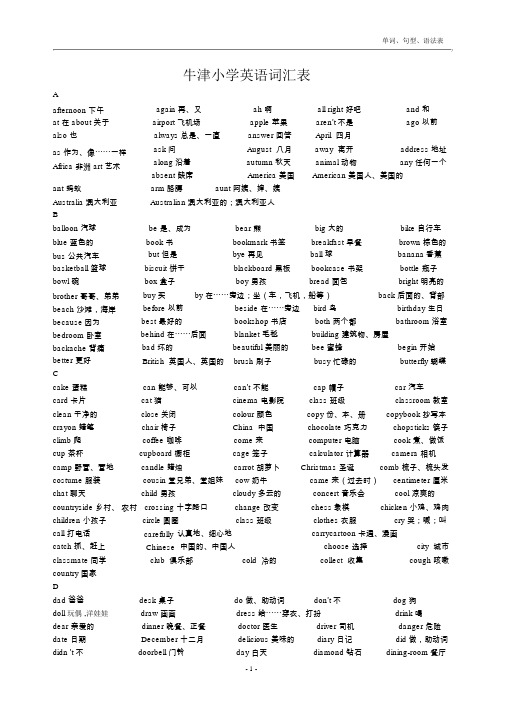
单词、句型、语法表牛津小学英语词汇表Aafternoon 下午at 在 about 关于also 也as 作为、像⋯⋯一样Africa 非洲 art 艺术ant 蚂蚁Australia 澳大利亚Bballoon 汽球blue 蓝色的bus 公共汽车basketball 篮球bowl 碗brother 哥哥、弟弟beach 沙滩,海岸because因为bedroom 卧室backache 背痛better 更好Cagain 再、又ah 啊all right 好吧and 和airport 飞机场apple 苹果aren’t不是ago 以前always 总是、一直answer 回答April 四月ask 问August 八月away 离开address 地址along 沿着autumn 秋天animal 动物any 任何一个absent 缺席America 美国American 美国人、美国的arm 胳膊aunt 阿姨、婶、姨Australian 澳大利亚的;澳大利亚人be 是、成为bear 熊big 大的bike 自行车book 书bookmark 书签breakfast 早餐brown 棕色的but 但是bye 再见ball 球banana香蕉biscuit 饼干blackboard 黑板bookcase 书架bottle 瓶子box 盒子boy 男孩bread 面包bright 明亮的buy 买by 在⋯⋯旁边;坐(车,飞机,船等)back 后面的、背部before 以前beside 在⋯⋯旁边bird 鸟birthday 生日best 最好的bookshop 书店both 两个都bathroom 浴室behind 在⋯⋯后面blanket 毛毯building 建筑物、房屋bad 坏的beautiful 美丽的bee蜜蜂begin 开始British英国人、英国的brush 刷子busy 忙碌的butterfly 蝴蝶cake 蛋糕can 能够、可以can’t 不能cap 帽子car 汽车card 卡片cat 猫cinema 电影院class 班级classroom 教室clean 干净的close 关闭colour 颜色copy 份、本、册copybook 抄写本crayon 蜡笔chair 椅子China 中国chocolate 巧克力chopsticks 筷子climb 爬coffee 咖啡come 来computer 电脑cook 煮、做饭cup 茶杯cupboard 橱柜cage 笼子calculator 计算器camera 相机camp 野营、营地candle 蜡烛carrot 胡萝卜Christmas 圣诞comb 梳子、梳头发costume 服装cousin 堂兄弟、堂姐妹cow 奶牛came 来(过去时)centimeter 厘米chat 聊天child 男孩cloudy 多云的concert 音乐会cool 凉爽的countryside 乡村、农村crossing 十字路口change 改变chess象棋chicken 小鸡、鸡肉children 小孩子circle 圆圈class 班级clothes 衣服cry 哭;喊;叫call 打电话carefully认真地、细心地carrycartoon 卡通、漫画catch 抓、赶上Chinese中国的、中国人choose 选择city 城市classmate 同学club 俱乐部cold 冷的collect 收集cough 咳嗽country 国家Ddad 爸爸desk 桌子do 做、助动词don’t不dog 狗doll 玩偶,洋娃娃draw 画画dress 给⋯⋯穿衣、打扮drink 喝dear 亲爱的dinner 晚餐、正餐doctor 医生driver 司机danger 危险date 日期December 十二月delicious 美味的diary 日记did 做,助动词didn ’t不doorbell 门铃day 白天diamond 钻石dining-room 餐厅- 1 -door 门duck 鸭子different 不同的dragon 龙fly 飞Eeat 吃eight 八eighteen 十八eighty 八十eleven 十一English 英语ear 耳朵egg 蛋eye 眼睛early 早地earphone 耳机Easter 复活节excited 激动的exciting 令人激动的envelope 信封everything 每件东西、每件事elephant 大象else 其它的evening 傍晚earache 耳朵疼e-mail 电子邮件England 英国Englisher 英语every 每一everybody 每个人exercise 练习、锻炼Ffan 迷、扇子father 父亲fifteen 十五fifty 五十five 五for 为、替、帮、给、对于⋯⋯来说、长达⋯⋯之久forty四十four 四fourteen 十四funny 有趣的,好玩的farmer 农夫、农场主football 足球fork 叉free 有空的、自由的fridge 冰箱friend 朋友fruit水果farm 农场favourite 最喜爱的February 二月festival 节日fifth第五film 电影fine 好的fourth 第四fun 乐趣、开心far 远的fax 传真finish完成、结束fish 鱼floor地板flower 花fly 飞follow跟随food 食物forget 忘记fast 迅速的、快的feel 感觉、摸起来fever 发烧fine 好的finger 手指fire 火foot 足、英尺France 法国Friday 星期五from 来自于Ggive 给glove 手套go 去goodbye 再见grandma 奶奶、姥姥green 绿色的guess 猜 girl 女孩glass 玻璃grandfather 爷爷、姥爷grandmother 奶奶、姥姥grape 葡萄great 好的get off 下车glasses 眼镜got 获取、取得(过去时)grass 草ground 地面get 获取、取得glad 高兴的、乐意的glue 胶水goal 目标game 游戏garden 花园grandpa 爷爷(口语)grandparent 爷爷和奶奶、姥姥和姥爷glow 发光、发热grasshopper 蝗虫、绿色蚱蜢grow 生长、成长Hhappy 开心的have 有、拥有、举行he 他(主格)he’s他是hello 喂、你好her 她(宾格)、她的(形容词性物主代词)here 这里here’s这是hey 嗨hi 嗨his 他的(形容词性或名词性物主代词)hmm 嗯hot 热的hundred 百hungry 饥饿的hair 头发hamburger 汉堡包head 头hospital 医院how 如何、怎样hurry 匆忙had( have 过去时)hairdryer 吹风机hers 她的(名词性物主代词)holiday 假日heavy 重的history 历史hotel 饭店Halloween 好莱乌help 帮助hill 山him 他(宾格)home 家homework 作业horse 马house 房子housework 家务half 一半hand 手headache头痛hear 听见high 高的hobby 爱好hope 希望housewife 家庭主妇II 我(主格)I ’m 我是ill 生病的in 在⋯⋯里面it’s它是ice-cream 冰淇淋I ’ll 我将要insect 昆虫interesting 有趣的Internet 网络JJanuary 一月份July 七月份June 六月join 参加jump 跳Japan 日本Japanese日语、日本人的jacket 夹克衫jeans 牛仔裤job 工作(可数名词)juice果汁- 2 -Kkey 钥匙、关键的、重要的kite 风筝kilo 千克、公斤(量词)knife 小刀keep 保持、保存、借keeper 看守人、守卫、门卫、监护人kilometer 公里、千米(量词)kitchen 厨房know 知道knee 跪Llate 晚的、迟的let 让let’s让我们like 喜欢、像⋯⋯一样lion 狮子long 长的 look 看、看起来love 爱lunch 午餐library 图书馆last 持续litter 升(量词)lake 湖letter 信low 低的lamp 羊羔lantern 元宵、灯笼large 大的laugh 笑learn 学会、掌握lesson 功课live 居住、生活left (leave 的过去时 )离开、剩下的leg 大腿lie 躺、撒谎line 线、排队London 伦敦loudly 大声地Mme 我(宾格)Miss 小姐monkey 猴子mother 妈妈、母亲Mr 先生mum 妈妈(口语)my 我的man 男人map 地图minibus 迷你型公共汽车mouth 嘴巴move 移动、搬March 三月份May 五月份mean 意思是、意味着meet 遇见、碰面milk 牛奶mine 我的(名词性物主代词)mirror 镜子moment 时刻mountain 山must 必须machine 机器met( meet 的过去时)minute 分钟miss 想念more 更、越most 最museum 博物馆magazine 杂志make 做、使mask 面具maths 数学model 模型moon 月亮morning 早上mouse 老鼠music 音乐many 许多medicine 药minus 减去Monday 星期一Nnew 新的nice 好的nine 九nineteen 十九ninety 九十no 不not 不notebook 笔记本now 现在name 名字near 附近noodles 面条nose 鼻子nurse 护士nearby 附近nobody 没有人note 记笔记November 十二月份 next 下一个No. 号码number 号码need 需要newspaper 报纸neck 脖子night 夜晚Ooh 哦OK 好的one 一open 打开orange 橙子;橙色的o’clock ⋯⋯点钟office 办公室old 年龄大的;旧的or 或者our 我们的 (形容词性 ) October 十月份ours 我们的(名词性)only 唯一的;仅仅outing 外面of⋯⋯的Over 在⋯⋯上面;超过often 经常order 命令;订单;点菜确other 其他的Ppair 对;双panda 熊猫pen 钢笔pencil 铅笔pencil case 铅笔盒perhaps 也许;可能photo 照片please 请pretty 漂亮的;非常puppet 小狗purse 钱包puzzle 困惑park 公园party 党;聚会peach 桃子pear 梨子piano 钢琴picture 图画pie 薄饼pineapple 菠萝plane 飞机plate 碟子play 玩playground 操场policeman 警察policewoman 女警察people 人们pick 捡;摘point 指向popular 流行的;受欢迎的present 礼物public 公共的penfriend 笔友picnic 野餐place 地方plan 计划player 球员;队员postcard 明信片project 工程paper 纸parent 父母pig 猪pot 壶pumpkin 南瓜put 放past 过去的PE 体育- 3 -Qquestion 问题quick 快的;迅速的Rrabbit 兔子rice 米饭rain 雨;下雨row,排;行ready 乐意的S quickly快地;迅速地quiet 安静的quarter 一时刻;四分之一quietly安静地read 读red 红色的rubber 橡皮擦ruler 直尺race 赛跑relative 亲戚remember 记住roll 翻滚;滚动rainy 下雨的ran 跑步( run 的过去时)road 公路;马路rectangle 长方形ride 骑ring 铃响;打电话room 房间;空间really真正地rest 休息right 对的;正确的scarf 围巾schoolbag 书包see看见(过去时 saw)seven 七seventeen 十七seventy 七十she 她she’s她是shoe鞋子shop 商店short 短的shorts 宽松的运动短裤sit 坐(过去时 sat)school 学校sir 先生sister 姐;妹smart 聪明的;伶俐的snack bar 快餐厅sometimes 有时候songbook 歌谣集;歌集spoon 汤匙station 车站student 学生supermarket 超市sweet 甜的six 六sixteen 十六sixty 六十skirt 裙子small 小的so 如此;那么socks 短袜子soft drink 清凉饮料;无醇饮料some 一些sorry 对不起;抱歉的storybook 故事书sure 相信的;有把握的sweater 毛衣seat 座位second 第二September 九月份should 应该shouldn’t不应该sign 标志;手势;暗号sixth 第六skateboard 滑板smoke 抽烟something 某些事suddenly 突然地sunny 阳光充足的season 季节shout 喊;叫slow 慢的snowman 雪人spring 春天steal 偷stop 停止;站牌strong 强壮的summer 夏天Saturday 星期六shape 形状;外形show 表演;放映;展示;显示sing 唱歌sitting-room 客厅skate 滑冰ski 滑雪sleep 睡着slide 滑行sofa 沙发song 歌曲square 正方形;广场stand 站star 星星start 开始;出发stove 火炉street 街道study 学习sun 太阳Sunday 星期天sweep 打扫;清除swing 摇摆;摇荡same相同的;一样的say 说science 科学ship 船shoulder 肩膀Social Science 社会学soon 不久;很快地(指时间)speak 讲special 特殊的spend 花费sport 运动stamp 邮票stay 停留still 仍然;还stomach ache 胃痛;肚子痛story 故事subject 科目surf 冲击;冲浪Ttape 录音磁或影带ten 十thank 谢谢that 那个that’s那个是the 这或那个或些they 他们they’re 他们是think认为thirsty 渴的thirteen 十三thirty 三十this 这个Three 三tiger 老虎time 时间tired 累的too 太toy 玩具twelve 十二twenty 二十table 桌子taxi 出租车tea 茶teacher 教师theatre 戏剧院their 他们的them 他们(宾格)then 然后;接着there 那儿;那里there’s有these 这些those 那些to 到;往today 今天train 火车tree 树try 尽力;尝试T-shirt 休闲服; T 恤TV 电视taste 尝(味道)teapot 茶壶theirs 他们的(名词性)third 第三twelfth 第十二twentieth 第二十twenty-first 第二十一take 拿;取tall 高的than 比较thief 贼told 告诉 (tell 的过去时 )true 真的- 4 -twin 孪生儿;双胞胎之一teach 教telephone 电话telescope 望远镜tent 帐篷term 学期thin 瘦的thing 事情tin 罐头tin-opener 开罐器;罐头刀together 一起toilet 厕所tomorrow 明天towel 毛巾triangle 三角形talk 谈话tell 告诉Thursday 星期四time 时间;次或倍数;时代toe 脚趾tooth 牙齿town 镇trick 愚弄;戏弄Tuesday 星期二turn 转身;转向;翻转Uumbrella 雨伞use 使用under 在⋯⋯下面us 我们(宾格)UK 英国uncle 叔叔USA 美国usually 通常VVCD光碟volleyball 排球vase 花瓶very 很;非常visit 参观;访问visitor游客;访客Wwalk 走wall 墙wash 洗with 与⋯⋯一起;带着;有;用work 工作world 世界wallet 钱包was 是(过去时)went 去( go 的过去时)were 是(过去时)weren’t不是when 当⋯⋯的时候when’s什么时候是wonderful 精彩的water bottle 水壶what 什么(事情;话;东西)what ’s是什么where 在哪里where’s 哪里是whose 谁的 wolf 狼word 单词;话语write 写waiter 服务员waitress 女服务员want 想要watch 观看;观察watermelon 西瓜we 我们we ’re 我们是which 哪个;哪些white 白色的who 谁who ’s谁是window 窗户woman 女人worker 工作wow 哇wrong 错误的warm 暖和的way 路;方法;方式weather 天气will 将要windy 刮风winter 冬天wish 希望;愿望Wednesday 星期三week 星期;周weekend 周末well 好why 为什么YYellow 黄色的yes 是的you 你(们)your 你(们)的you’re 你(们)是yuan 元(人民币单位)yours,你(们)的(名词性)yesterday 昨天you ’ll 你(们)将要young 年轻的year 年yo-yo 溜溜球;(俚语)傻瓜;笨蛋yet 然而;还(否或疑问句中)ZZoo 动物园zebra斑马- 5 -牛津小学英语词汇表中的词组及句型Aa glass of 一(玻璃)杯 a pair of 一对,一副a cup of 一(茶)杯Anything else ?(还要)其它东西吗?as⋯ as 和⋯⋯一样ask for 要求,请求after school 放学后at home 在家at the back of 在⋯⋯的后面Bboys and girls 男孩和女孩们by the way 顺便说(问)一下blow out 吹灭(灯火等)、(使火)熄灭、轮胎(爆裂);取消、中止ball game 球类比赛Bank of China 中国银行Beijing opera 京剧by bus 乘公共汽车Ccome here 来这儿;来一下come home 回家computer room 计算机房Can I help you? 我可能帮助你吗?come down 倒塌;流传下来;病倒;(物价等)下跌Children ’s Day 六一儿童节Christmas Day 圣诞节Computer Studies 计算机学习camping site 野营营地come up 走过来DDon’tworry 不要担心!Dragon Boat Festival (中国)端午节单词、句型、语法表a carton of 一(纸)盒at once 马上a lot (of) 许多at school 在学校be late for 因⋯⋯迟到be good at 善长于⋯⋯come in 进来CD Walkman光盘随身听camping trip 野营旅行dress up 穿上盛装;装扮Eeach other 互相;彼此excuse me 对不起;请原谅;打扰了(用于麻烦别人时)!Ffrom ⋯ to⋯从⋯⋯到⋯⋯Gget up 起床go to bed 上床睡觉good evening/morning/night晚上、早上好;晚安get on 上车get to 到达go for a walk 去散步go on an outing 外出郊游HHappy Teachers’Day 教师节快乐!have a look 看一看How lovely!多么可爱啊!help⋯ with ⋯帮助某人做⋯⋯Happy birthday to you ! 祝你生日快乐!have class上课How about ⋯ ? 做⋯⋯如何、怎么样?how many 多少?(修饰可数名词)how much 多少?(修饰不可数名词)how old 多少岁?II don ’tknow 我不知道I see 我明白、知道I ’ve got 我已经得到⋯⋯in front of 在⋯⋯前面I ’d love to ⋯我想;我愿意in class 上课的时候In which box?在哪个盒子?Jjust now 刚才Kgo to school 上学Good idea. 好主意go shopping 去购物Here you are 给你。
牛津小学英语3A3B4A4B词汇
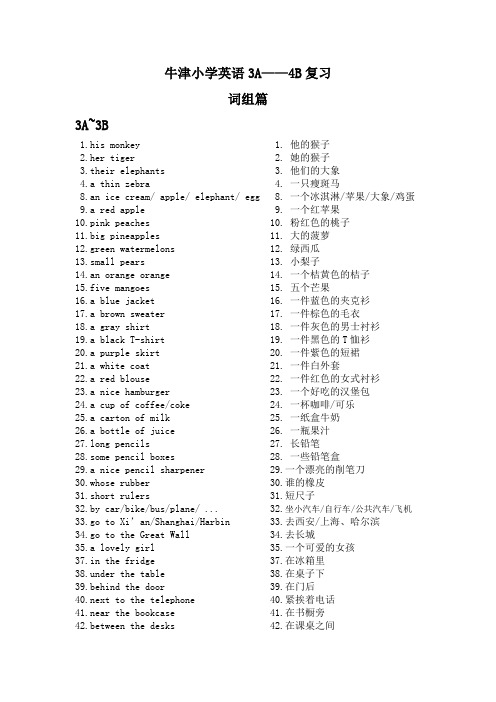
牛津小学英语3A——4B复习词组篇3A~3B1.his monkey 1. 他的猴子2.her tiger 2. 她的猴子3.their elephants 3. 他们的大象4.a thin zebra 4. 一只瘦斑马8.an ice cream/ apple/ elephant/ egg 8. 一个冰淇淋/苹果/大象/鸡蛋9.a red apple 9. 一个红苹果10.pink peaches 10. 粉红色的桃子11.big pineapples 11. 大的菠萝12.green watermelons 12. 绿西瓜13.small pears 13. 小梨子14.an orange orange 14. 一个桔黄色的桔子15.five mangoes 15. 五个芒果16.a blue jacket 16. 一件蓝色的夹克衫17.a brown sweater 17. 一件棕色的毛衣18.a gray shirt 18. 一件灰色的男士衬衫19.a black T-shirt 19. 一件黑色的T恤衫20.a purple skirt 20. 一件紫色的短裙21.a white coat 21. 一件白外套22.a red blouse 22. 一件红色的女式衬衫23.a nice hamburger 23. 一个好吃的汉堡包24.a cup of coffee/coke 24. 一杯咖啡/可乐25.a carton of milk 25. 一纸盒牛奶26.a bottle of juice 26. 一瓶果汁27.long pencils 27. 长铅笔28.some pencil boxes 28. 一些铅笔盒29.a nice pencil sharpener 29.一个漂亮的削笔刀30.whose rubber 30.谁的橡皮31.short rulers 31.短尺子32.by car/bike/bus/plane/ ... 32.坐小汽车/自行车/公共汽车/飞机33.go to Xi’an/Shanghai/Harbin 33.去西安/上海、哈尔滨34.go to the Great Wall 34.去长城35.a lovely girl 35.一个可爱的女孩37.in the fridge 37.在冰箱里38.under the table 38.在桌子下39.behind the door 39.在门后40.next to the telephone 40.紧挨着电话41.near the bookcase 41.在书橱旁42.between the desks 42.在课桌之间43.between the sofa and the bed 43.在沙发和床之间44.in front of the building 44.在大楼前面45.beside the window 45.在窗子旁边46.some big lights 46.一些大的灯47.a big tap 47.一个大的水龙头48.a small basket 48.一个小篮子49.an old tape 49.一个旧修正带50.an English girl 50.一个英国女孩51.lots of hair 51.许多头发52.from London 52.来自伦敦53.a Chinese boy 53.一个中国男孩54.green tea 54.绿茶55.black tea 55.红茶56.in the cupboard 56.在碗橱里57.orange juice 57.桔汁58.turn on the light 58.开灯59.turn off the TV 59.关电视60.open the white door 60.开白色的门61.close the window 61.关窗62.study/learn English 62.学英语63.read and write 63.读和写64.a bright classroom 64.一个明亮的教室68.what colour 68.什么颜色69.like… very much 69.非常喜欢…70.look at 70.看71.his smart jacket 71.他的时髦的夹克衫72.her pretty blouse 72.她的漂亮的衬衫73.not bad 73.还不错74.not so good 74.不太好75.get up 75.起床e here/down 77.过来/下来78.excuse me 78.打扰一下79.in English/Chinese 79.用英语/中文80.toy train 80.玩具火车81.my new stapler 81.我的新订书机82.his old knife 82.他的旧小刀83.that good storybook 83.那本好故事书84.twelve crayons 84.12只蜡笔85.my father’s camera 85.我爸爸的照相机86.his uncle and aunt’s computer 86.他叔叔阿姨的电脑87.her twins’ radio 87.双胞胎的收音机88.your brother’ s watch 88.你哥哥的手表89.the big clock 89.这个大钟90.the girl’s key 90.这个女孩的钥匙91.family photo 91.家庭照片92.have lunch/breakfast/supper/dinner 92.吃午饭/早饭/晚饭93.two plus three 93.2加394.ten minus six 94.10减695.in the kitchen 95.在厨房里96.his daughter’s study 96.她女儿的书房97.their bathroom 97.他们的浴室98.clean my room 98.打扫房间99.an old broom 99.一把旧扫帚100.sounds good 100.听上去很好101.hot dog 101.热狗102.what/how about 102.…怎么样?103.some juice 103.一些果汁104.soft drinks 104.软饮料105.some bread/rice 105.一些面包/米饭106.a bar of chocolate 106.一块巧克力107.nine pies 107.9块馅饼108.seven sandwiches 108.7块三明治109.wash the rice 109.淘米110.how much/ how many 110.多少111.forty vests 111.40件背心112.nineteen ties 112.19条领带113.fifteen caps 113.顶帽子(没边沿的)114.a pair of trousers/shorts 114.一条裤子/短裤115.eleven pairs of shoes 115.11双鞋子116.thirteen belts 116.13条腰带117.eighteen pairs of socks 117.18双袜子118.play the piano/ the violin/ the guitar 118.弹钢琴/拉小提琴/弹吉它119.play the accordion 119.拉手风琴120.play volleyball 120.打排球121.play baseball 121.打棒球122.play ball games 122.玩球类游戏123.like swimming 123.喜欢游泳124.go skiing 124.去滑雪125.go skating 125.去溜冰126.go fishing 126.去钓鱼127.go jogging 127.去慢跑128.go rowing 128.去划船129.go climbing 129.去爬山130.go running 130.去跑步131.go swimming 131.去游泳4A~4B1.your purse/wallet 1.你的钱包2.look at/for/after/around/like… 2.看…/寻找/照看/环顾四周/看起来像3.look at his fan 3.看他的扇子4.so big 4.那么大5.whose jacket 5.谁的夹克衫6.see you in the afternoon 6.下午见7.look tired 7.看起来累了8.welcome to… 8.欢迎来到…9.a tall doctor 9.一个高个子医生10.a good nurse 10.一个好护士11.in the tree 11.在树上12.on the tree 12.在树上(长在树上)13.let me see 13.让我看看14.climb the hill / mountain 14.爬山15.listen to a Walkman 15.听随身听16.on the zebra crossing 16.在斑马线上17.the policeman over there 17.那边的警察18.the policewoman in the office 18.在办公室里的女警19.the actress in the white skirt 19.穿着白色短裙的女演员20.the waiter with big eyes 20.有着大眼睛的男服务员21.the cook with a big head 21.有着一个大头的厨师22.the driver with small ears 22.有着小耳朵的司机23.the waitress with a small mouth 23.有着小嘴巴的女服务员24.the worker with a big nose 24.有着大鼻子的工人25.be late for… 25.迟到了26.an old farmer 26.一个老农27. on a cold moring 27.在一个寒冷的早晨28.cold weather 28.寒冷的天气29.sing happily 29.快乐的唱30.these grapes 30.这些葡萄31.those biscuits 31.那些饼干32.four kilos 32.四公斤33.go to the theatre/airport/library/ 33.去剧院/机场/图书馆/医院/车站hospital/station/supermarket /cinema 超市/电影院34. a good idea 34.好主意35.something to eat/drink 35.吃/喝些什么36.angthing else 36.还要什么37.a bowl of noodles 37.一碗面条38. beside the music room 38.音乐室里的糖果39.draw a playground on the blackboard39.在黑板上画一个操场40.a map of China 40.一幅中国地图41.have some juice 41.喝些果汁42.knife and fork 42.刀和叉e the chopsticks 43.使用筷子44.the plates in the cupboard 44.在碗橱里的盘子45.eat the rice with a spoon 45.用勺子吃米饭46.try again 46.再试一次47.let me try 47.让我试试48.play with your balloon 48.玩你的球。
牛津小学英语6B第三单元知识点整理与练习
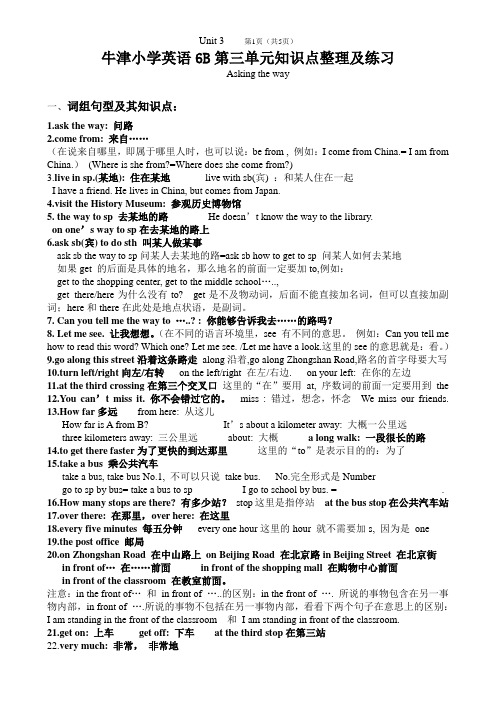
牛津小学英语6B第三单元知识点整理及练习Asking the way一、词组句型及其知识点:1.ask the way: 问路e from: 来自……(在说来自哪里,即属于哪里人时,也可以说:be from , 例如:I come from China.= I am from China.)(Where is she from?=Where does she come from?)3.live in sp.(某地): 住在某地live with sb(宾) :和某人住在一起I have a friend. He lives in China, but comes from Japan.4.visit the History Museum: 参观历史博物馆5. the way to sp 去某地的路He doesn’t know the way to the library.on one’s way to sp在去某地的路上6.ask sb(宾) to do sth 叫某人做某事ask sb the way to sp问某人去某地的路=ask sb how to get to sp 问某人如何去某地如果get 的后面是具体的地名,那么地名的前面一定要加to,例如:get to the shopping center, get to the middle school…..,get there/here为什么没有to?__get是不及物动词,后面不能直接加名词,但可以直接加副词;here和there在此处是地点状语,是副词。
7. Can you tell me the way to …..? : 你能够告诉我去……的路吗?8. Let me see. 让我想想。
(在不同的语言环境里,see 有不同的意思。
例如:Can you tell me how to read this word? Which one? Let me see. /Let me have a look.这里的see的意思就是:看。
小学牛津英语六年级B第7单元单词及造句应用
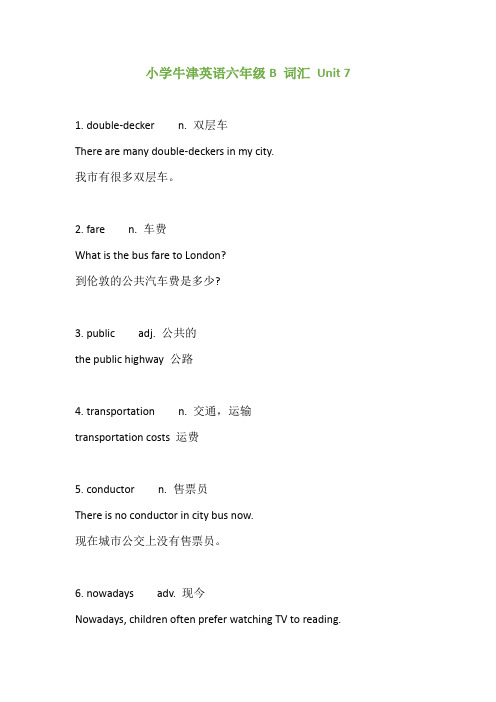
小学牛津英语六年级B 词汇Unit 71. double-decker n. 双层车There are many double-deckers in my city.我市有很多双层车。
2. fare n. 车费What is the bus fare to London?到伦敦的公共汽车费是多少?3. public adj. 公共的the public highway 公路4. transportation n. 交通,运输transportation costs 运费5. conductor n. 售票员There is no conductor in city bus now.现在城市公交上没有售票员。
6. nowadays adv. 现今Nowadays, children often prefer watching TV to reading.如今,儿童常爱看电视而不爱看书。
7. instead adv. 代替;更换We've no coffee. Would you like tea instead?我们没有咖啡了。
改喝茶好吗?8. single decker n. 单层车Most buses in my city are single deckers.我市的大多数公交车都是单层车。
9. most pron. 大多数I like most vegetables.大多数的蔬菜我都喜欢。
10. none pron. 没有一个We had three cats once none (of them) is/are alive now.我们曾有三只猫--现在一个活的也没有了。
11. still adv. 仍然;依旧;还是He still hopes for a letter from her.他仍盼望她能来信。
12. perhaps adv. 也许;大概;可能Perhaps the weather will change this evening.今晚可能要变天。
小学牛津英语六年级B第8单元单词及造句应用
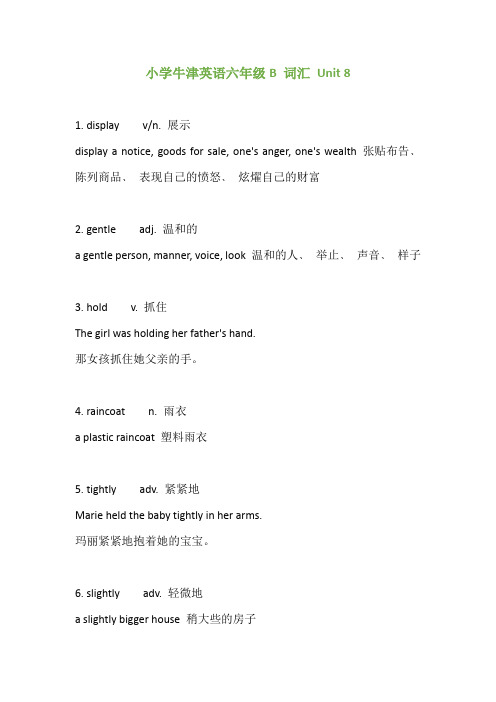
小学牛津英语六年级B 词汇Unit 81. display v/n. 展示display a notice, goods for sale, one's anger, one's wealth 张贴布告﹑陈列商品﹑表现自己的愤怒﹑炫燿自己的财富2. gentle adj. 温和的a gentle person, manner, voice, look 温和的人﹑举止﹑声音﹑样子3. hold v. 抓住The girl was holding her father's hand.那女孩抓住她父亲的手。
4. raincoat n. 雨衣a plastic raincoat 塑料雨衣5. tightly adv. 紧紧地Marie held the baby tightly in her arms.玛丽紧紧地抱着她的宝宝。
6. slightly adv. 轻微地a slightly bigger house 稍大些的房子7. pot n. 盆pots and pans 锅碗瓢盆8. flat n. 一套房间They're renting a furnished flat on the third floor.他们租了四楼的一套带家具的房间。
9. move v. 移动;(使)改变位置I could hear someone moving (about/around) in the room above.我听见楼上有人(来回)走动。
10. quickly adv. 快速地speak, write, run, learn very quickly 说得﹑写得﹑跑得﹑学得很快11. windsurf v. 进行帆板运动I went windsurfing most afternoons.下午我都去风帆冲浪。
12. typhoon n. 台风The 169 000-ton vessel went down during a typhoon in the South China Sea.这艘十六万九千吨的轮船在中国南海遭遇了台风,沉没了。
- 1、下载文档前请自行甄别文档内容的完整性,平台不提供额外的编辑、内容补充、找答案等附加服务。
- 2、"仅部分预览"的文档,不可在线预览部分如存在完整性等问题,可反馈申请退款(可完整预览的文档不适用该条件!)。
- 3、如文档侵犯您的权益,请联系客服反馈,我们会尽快为您处理(人工客服工作时间:9:00-18:30)。
牛津小学英语4B词汇句型归纳发布者:zsl 作者: 加入日期:06-03-13Unit. 1new 新的 a student 一名学生welcome 欢迎 a teacher 一名教师our 我们的 a nurse 一名护士a school 一所学校 a boy 一名男孩a tree 树 a girl 一名女孩climb 爬 a man 一个男人(复:men)sir 先生 a woman 一个妇女(复:women)again 下一次 a doctor 一名医生thank you 谢谢你come down 下来that boy 那个男孩let me see 让我看看Excuse me ! 对不起climb trees 爬树in the tree 在树上come here 过来You’re right 你是对的over there 在那边Who’s that….? He’s / She’s….. He’s / She’s a ….Who’s that man? He’s Mr Brown. He’s a doctorAre you a …? Yes, I am. / No, I’m not.Are you a teacher? No, I’m not. I’m a doctor.Unit 2grandfather 祖父,外祖父hair 头发grandmother 祖母,外祖母 a head 一个头father 父亲an eye 一只眼睛mother 母亲an ear 一个耳朵brother 兄弟 a nose 一只鼻子sister 姐妹 a mouth 一个嘴巴evening 晚上late 晚的with 具有…的特征party 聚会white 白色hurry 赶快skirt 短裙friend 朋友good evening 晚上好that girl 那个女孩the boy with big eyes 大眼睛的那个男孩the girl with a small mouth小嘴巴的那个女孩which one 哪一个the one in the white skirt 穿白短裙的那一个the girl in the white skirt 穿白短裙的那个女孩let’s hurry 让我们快点in the car 在小汽车里we’re late for the party. 我们聚会迟到了。
Who’s the …...with…? He’s / She’s my….Who’s the boy with a big mouth? He’s my brother.Is that……your……? Which one? The one in the…….. Yes, he / she is. No, he / she isn’t. Is that man your father? Which one? The one in the black coat. No, he isn’t.Unit 3a policeman 一名警察(复:policemen) a worker 一名工人a policewoman 一名女警察(复:policewomen) a cook 一名厨师a waiter 一名男服务员 a farmer 一位农民a waitress 一名女服务员(复:waitresses)an engineer 一名工程师a driver 一名驾驶员 a postman 一名邮递员(复:postmen)job 工作they 他(她,它)们how 怎么样,如何their 他(她,它)们的cold 冷的red 红色的today 今天sweater 毛衣old 老的about 大约sixty 六十guess 猜eighty 八十my name 我的名字your job 你的工作how old 多大,几岁their jobs 他们的工作look at that old woman 看那年老的妇女about sixty 大约六十I 我I am = I’m 我是my 我的You 你You are = You’re 你是your 你的He 他He is = He’s 他是his 他的She 她She is = She’s 她是her 她的They 他(她,它)们They are = They’re 他(她,它)们their 他们的Who am I ? 我是谁?How old am I ? 我几岁?You’re …Who are you? 你是谁?How old are you? 你几岁?I’m ….Who is he? 他是谁?How old is he ? 他几岁?He’s….Who is she? 她是谁?How old is she ? 她几岁?She’s….Who is Nancy? 南茜是谁?How old is Nancy? 南茜几岁?She’s….Who is the boy with big eyes? How old is the boy with big eyes ? He’s……Who are they? 他们是谁?How old are they ? 他们几岁?They’re….What’s my name? 我叫什么名字?What’s my job? 我做什么工作?You’re a…What’s your name? 你叫什么名字?What’s your job? 你做什么工作?I’m a……What’s his name? 他叫什么名字?What’s his job? 他做什么工作?He’s a….What’s her name? 她叫什么名字?What’s her job? 她做是什么工作? She’s a….What’s your father’s name? 你父亲叫什么名字?What’s your father’s job? He’s a….What are their names?他们叫什么?What are their jobs? 他们做什么工作?They’re…..What do you want to be? I want to be a/ an…..Unit 4an apple 一只苹果 a pineapple 一只菠萝an orange 一只橘子 a lemon 一只柠檬a banana 一只香蕉 a strawberry 一只草莓(复:strawberries)a peach 一只桃子(复:peaches) a mango 一只芒果(复:mangoes)a grape 一个葡萄 a watermelon 一只西瓜a pear 一只梨some 一些these 这些many 许多those 那些kilo 公斤,千克good 好的great 好极了how many 多少some apples 一些苹果the red one 红色的那个these or those 这些还是那些?Can I help you? 我能帮助你吗?(你要点什么)What are these / those ? They’re …What are these ? They’re apples. →Are these apples? Yes, they are.What are those ? They’re oranges. →Are those oranges? No, they aren’t.They’re teachers. →Are they teachers?What would you like? I’d like……I’d like some …,please. How many kilos? …kilo(s) , please. Here you are.I’d like some apples,please. How many kilos? Tow kilos, please. Here you are.Unit 6a station 一座火车站by train 坐(乘)火车a supermarket 一家超市by plane坐(乘)飞机a library 一座图书馆by metro坐(乘)地铁an airport 一座机场by motorcycle坐(乘)摩托车a hospital 一家医院by minibus 坐(乘)小型公交车a theatre 一座剧院by taxi 坐(乘)出租车late 晚的,迟的by bus 坐(乘)公交车free 空闲的on foot 步行go to the theatre 去剧院go there 去那里Are you free now? 你现在空吗?Good idea. 好主意Let’s go by taxi. 我们乘出租车去How do we go there? 我们怎么去那?How do you go to school? 你怎么去上学的?Shall we go to…by…? All right. ? OK.Shall we go to the library by minibus? All right.Shall we go to Xi’an by plane? No. How do we go there? Let’s go there by train.Is this(that)…for…?Is this train for the library? Yes, it, is.Is that plane for Shanghai? No, it isn’t.Unit 7a pie 一个馅饼 a sandwich 一个三明治(复:sandwiches)a hamburger 一个汉堡包chips 薯条sweets 糖果biscuits 饼干noodles 面条chocoloate 巧克力tea 茶coffee 咖啡juice 果汁(apple juice苹果汁)milk 牛奶hungry 饿的thirsty 渴的basketball 篮球bread 面包water 水move 移动some chips 一些薯条something to drink?来点喝的如何anything else 还要其他什么? A cup of tea 一杯茶how much 多少钱play basketball 打篮球I can’t move 我动不了It’s late 晚了,不早了See the doctor 看医生I don’t want to…我不想(做某事)have a sandwich 吃三明治some ice cream一些冰淇淋What can you see in the picture? 在图片里你能看见什么?What would you like? I’d like…..What would you like? I’d like some milkHow much is it? It’s…..yuan How much is the….? It’s….yuan.How much are they? They are…..yuan. How much are the….? They are….yuan.Unit 8a chair 一张椅子 a blackboard 一块黑板a noticeboard 一块布告板 a computer 一台电脑a picture 一张图片 a bookcase 一个书柜a tape recorder 一个录音机 a music room 一间音乐房an office 一间办公室 a playground 一个操场our 我们的big 大的bright 明亮的classroom 教室piano 钢琴window 窗户songbook 歌本near 在…附近T-shirt 体恤衫map 地图smart 时髦的,好看的word 单词them 他们(宾格)open 打开sometimes 有时候our classroom 我们的教室in your classroom 在你教室里near the window 在窗户旁lots of 许多I love China 我爱中国What’s in/on/ near…..? There’s / There are……….What’s in your desk? There’s a tape recorder. 在你课桌里有什么?有一台录音机What’s near the classroom? There are some bikes. 在教室旁有什么?有些自行车。
